
设计单位 ATMOSPHERE氣象建築
项目地点 中国上海
建成时间 2023年3月
建筑面积 108平方米
项目位于上海市黄浦区,地处新天地时尚商圈2期,紧邻两条地铁出站口,客流充沛且崇尚个性与自我表达。回归本次空间,作为品牌首个实体门店,其意义不言而喻,它不仅代表着BABAMA自2011年创立至今所沉淀、积累的抽象品牌精神与态度理念的具象凝结,同时也可看作一场从工业美学视角所切入的、有关传承与流行的深度对话。
Close to two subway exits, the project stands out with abundant customer flow and advocates individuality and self-expression in the second phase of the Xintiandi fashion business district in Huangpu District, Shanghai. As the first BABAMA store, it has great significance to the brand. It is a congealment of the brand spirit and philosophy that BABAMA has accumulated since its establishment in 2011, as well as an in-depth dialogue about inheritance and fashion from the perspective of industrial aesthetics.
从“心”出发,开启冒险新征程
From the heart, embark on a new adventure.
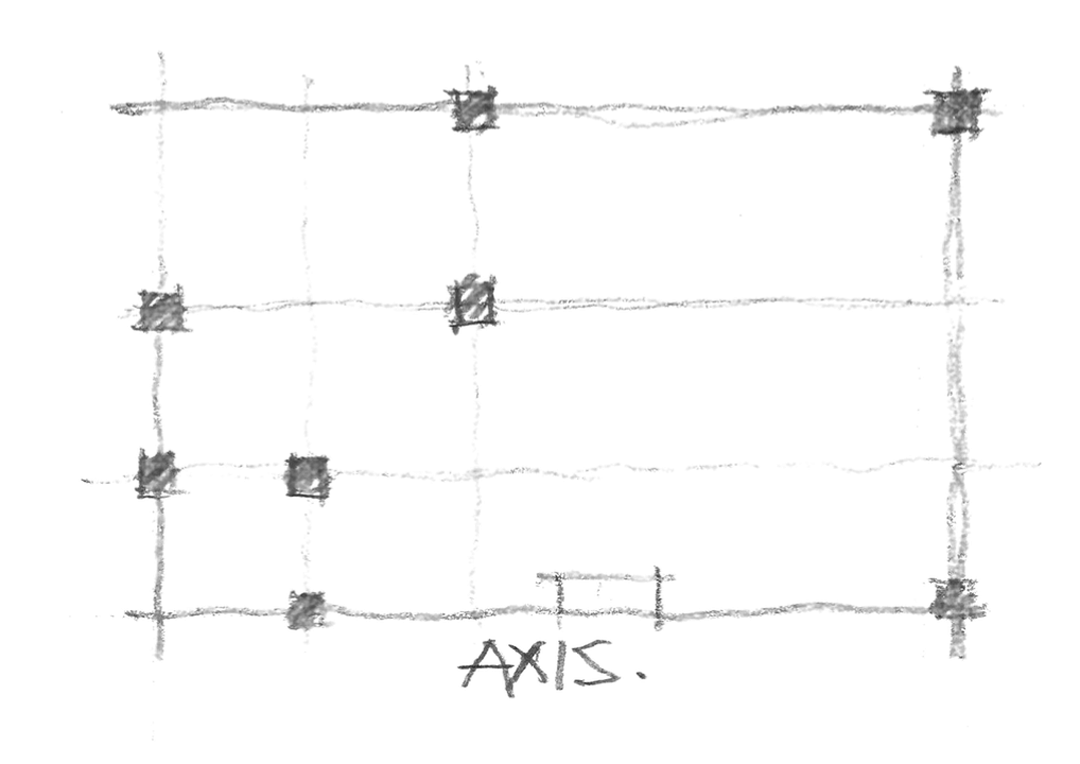
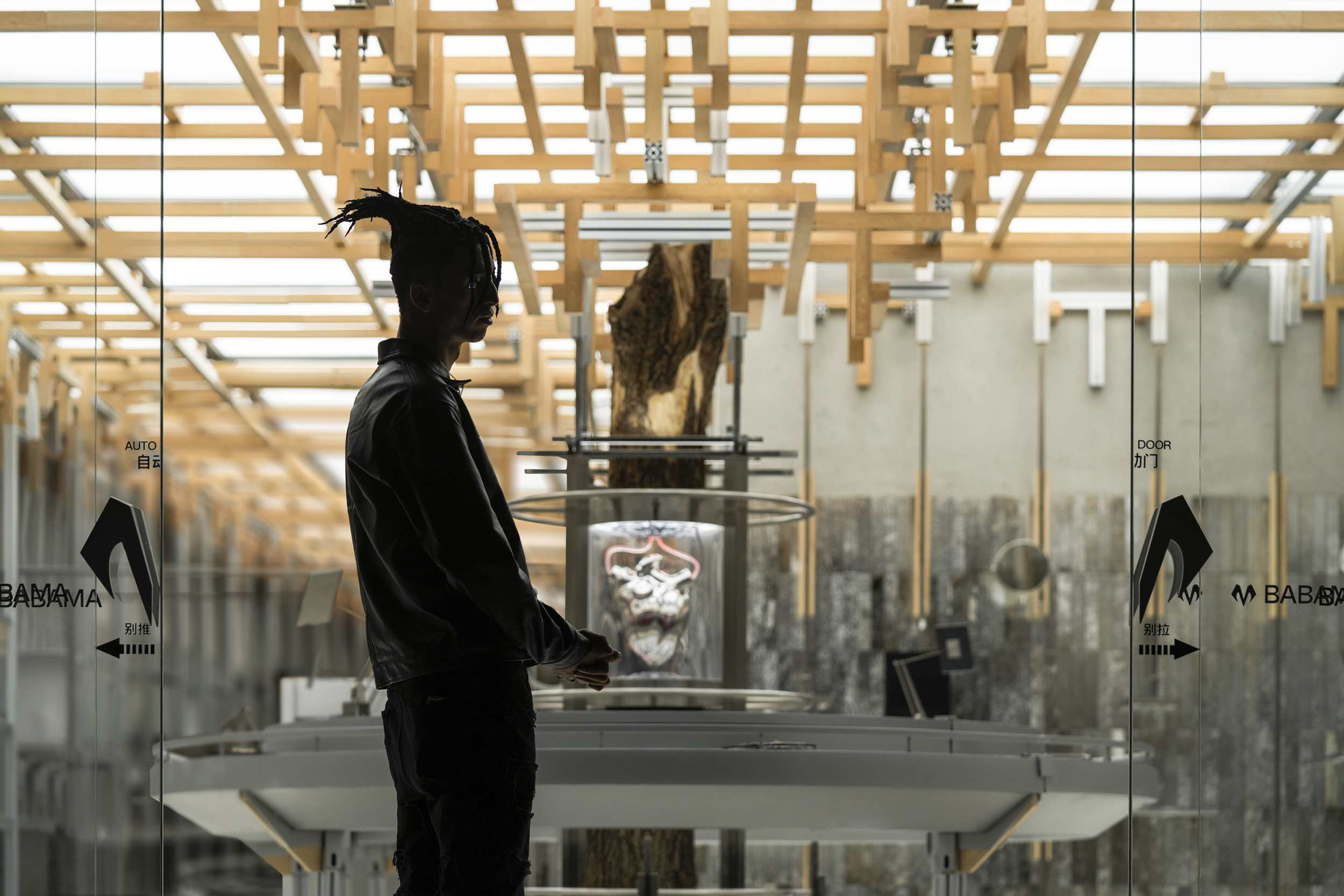
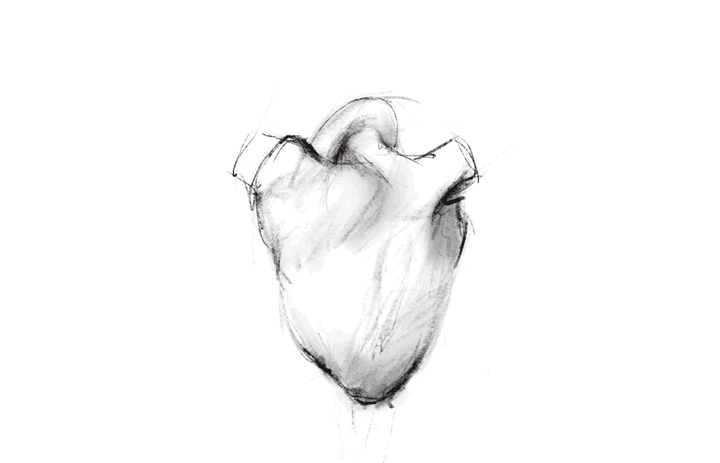
心脏,是生物循环系统中的重要“枢纽”。通过为血液流动提供压力,推动血液运行至身体各个部分,向器官、组织提供充足的血流量,供应氧和各种营养物质,使细胞维持正常的代谢和功能,以此使生物体维持运转、保有恒定生机。
The heart, an important hub in the biological circulatory system, provides pressure for blood flow and pushes blood to run through the whole body. It offers sufficient blood flow to organs to provide oxygen and various nutrients so that cells can maintain metabolism and function and keep organisms operating and maintaining vitality
“跳动的心脏”作为BABAMA核心元素之一,在此通过艺术装置的形式出现,让原有的品牌精神内核走进真实空间,成为可感且凝聚视觉的核心锚点。
As one of the core elements of BABAMA, the pumping heart appears in the form of an art installation, which brings the original core of the brand spirit into the real space and forms a core visual focus that can be perceived.
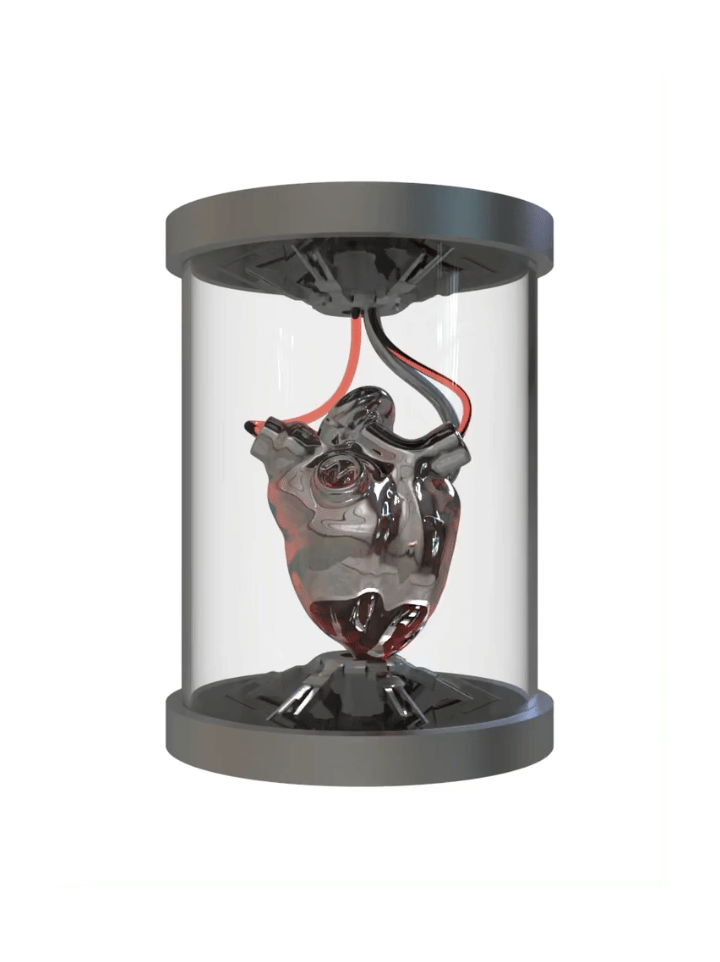
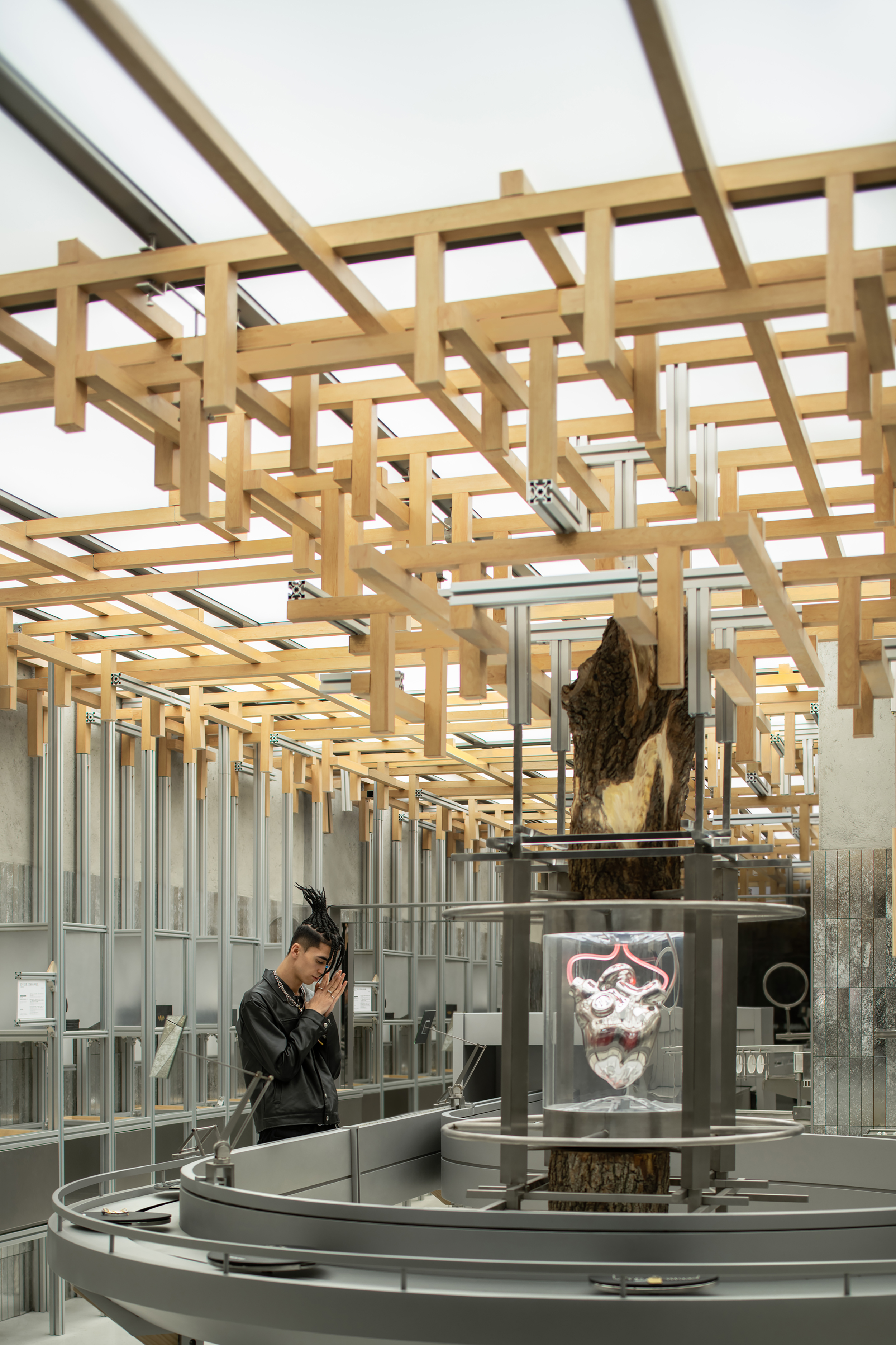
空间整体叙事逻辑在这一概念之下,通过对原本隶属于生物学层级、有关动脉分支与物质运输构造的循环系统理论的拆解,完成了设计视角之下的二次创作与转换。同时遵循血管物质运输的规律,建筑师进行相应的空间区域划分、动线设计与内容创作。在此布局之下,机械心脏装置成为空间核心,为各个子区域源源不断地“传输能量”。
The overall narrative logic of the space follows this design concept, which completed the secondary creation and transformation from the perspective of design by dismantling the biological circulatory system of arteries and the structure of material transportation in the body. The design follows the material transporting rule to arrange the space division, movement path design, and other creations. In this layout, the mechanical heart installation becomes the core of the space, continuously transporting energy for each area.
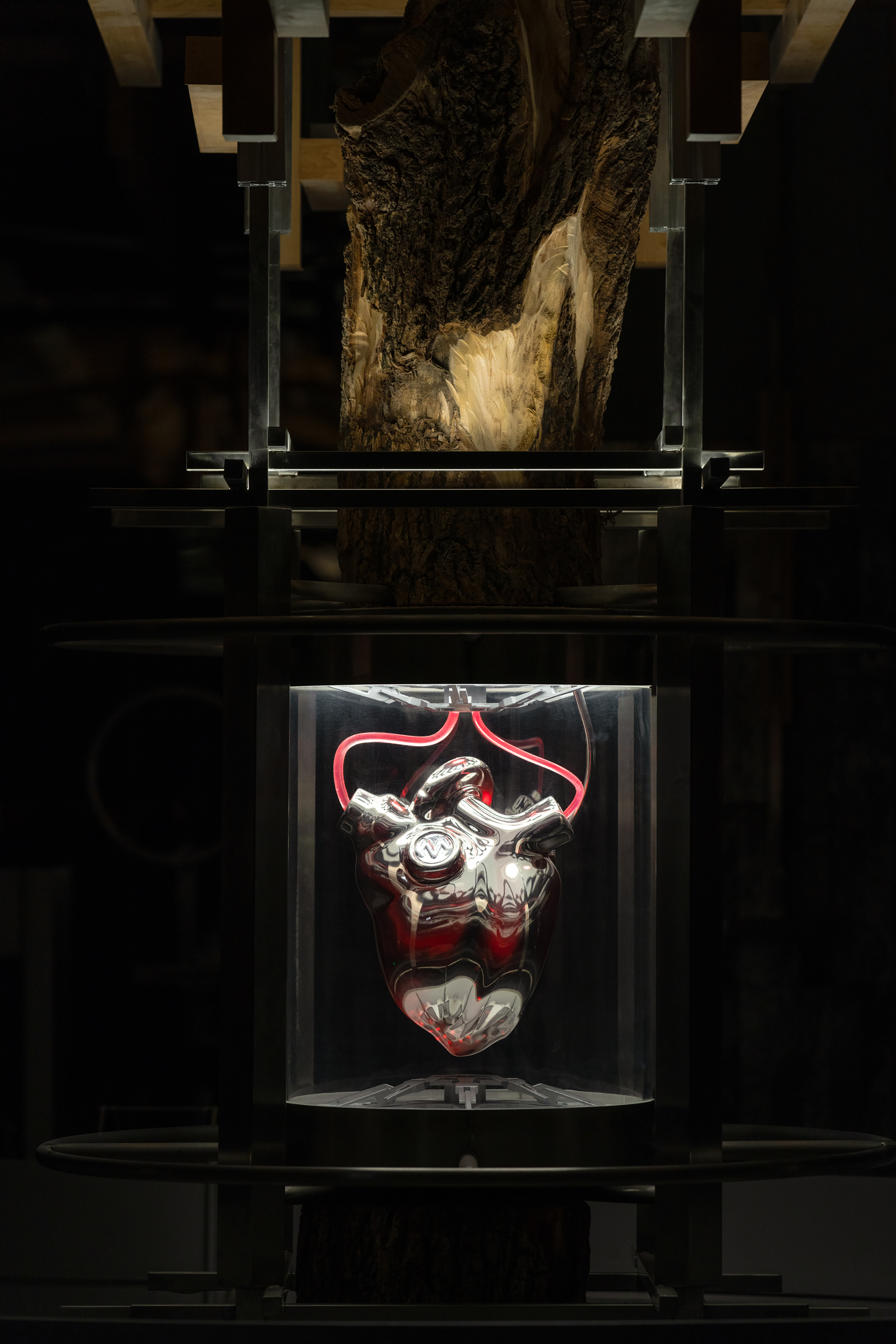

自然、机械、心脏。
Nature, machinery, and heart.
BABAMA以三大核心元素构建起属于自己的“循环系统”——以致敬传统工业美学为基底,融入自然元素与心脏意向,传递“跳动的生命体”这一品牌核心概念。这三种元素也将作为后续产品设计与当下实体空间呈现的重要支点。
BABAMA builds its own circulatory system with these three core elements. Paying tribute to traditional industrial aesthetics, the design integrates natural elements and heart images to convey the core brand concept of pulsating life, which is an important basis for subsequent product design and space arrangement.

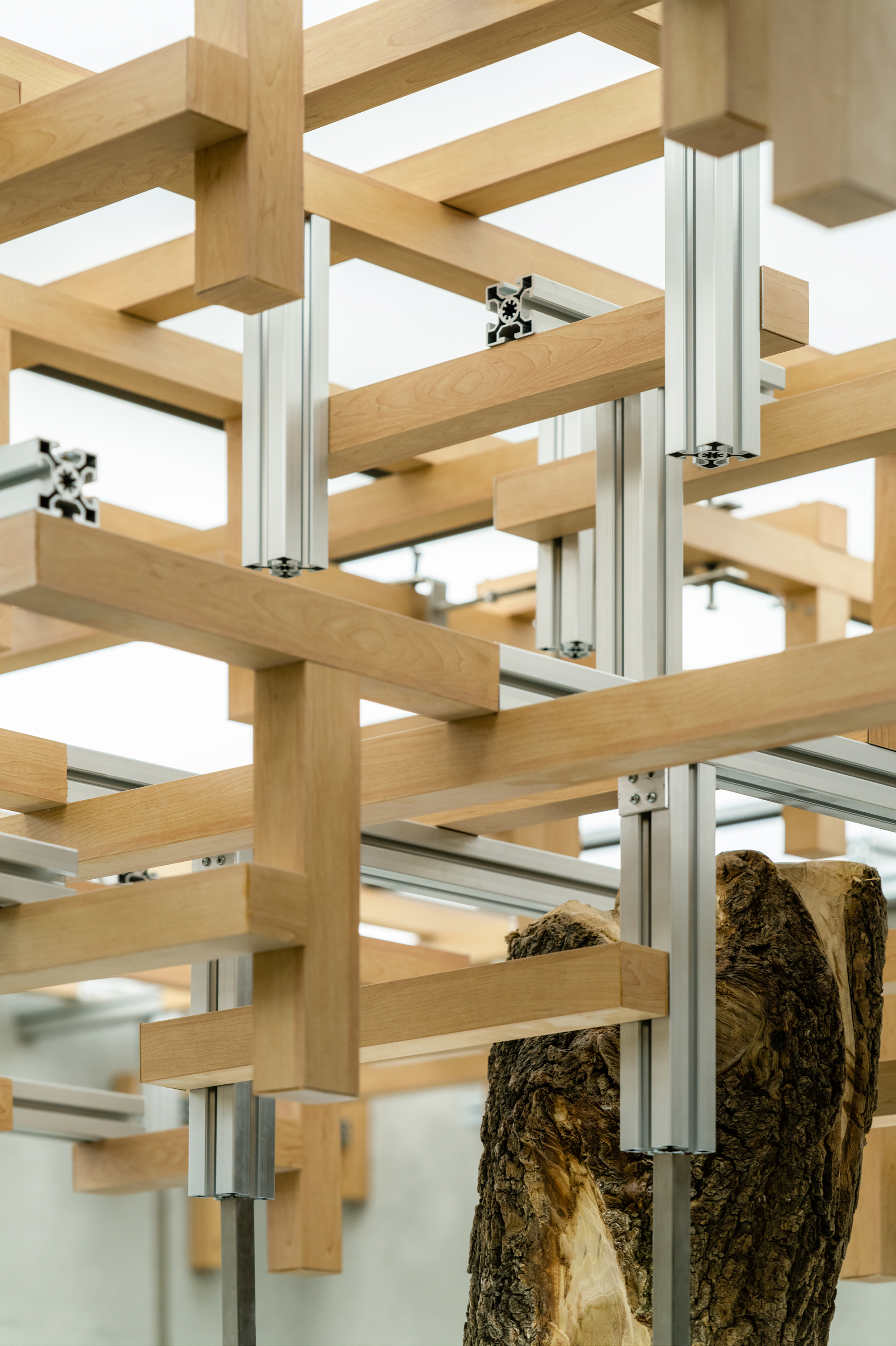
沿核心装置纵伸向上,建筑师模拟树木枝干的生长姿态,让金属与木质材料通过构件连接的方式蔓延至天花顶部,仿佛通过接收心脏所赋予的“能量”,在有限的空间中无限生长。
On the top of the core installation, a trunk combines with well-connected metals and wood to simulate a growing tree with branches reaching to the ceiling as if receiving the "energy" of the heart, and growing forever in the limited space.
铝型材与木头的材质的对撞,一方面延续了品牌既有的工业属性,另一方面则通过取材自然元素加入,在一定程度上中和了空间中强势的机械属性,创造出和谐共生的场景。
The contrast of aluminum and wood extends the industrial style of the brand and neutralizes the strong mechanical sense of the space to a certain extent through natural materials, creating a harmonious coexistence.

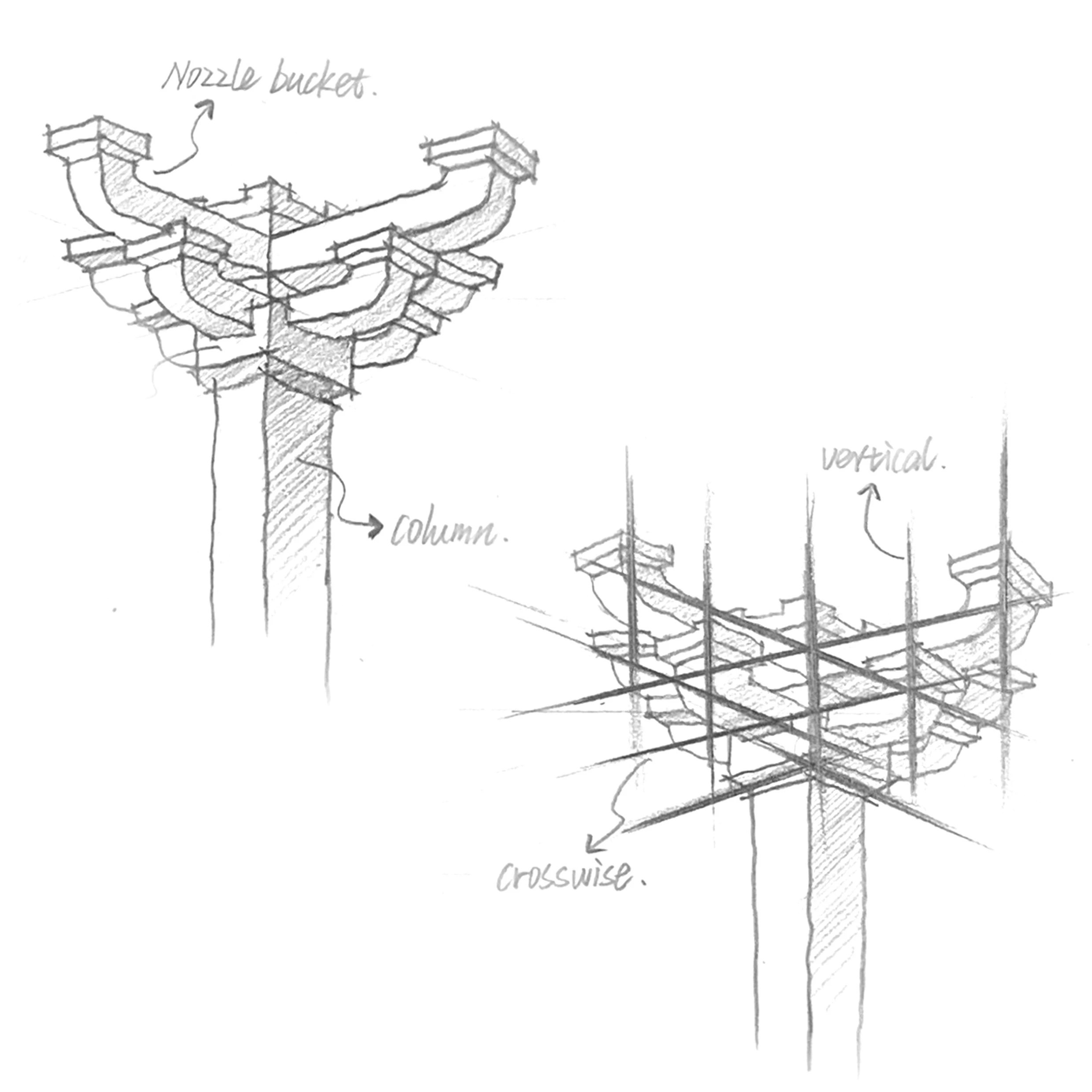
斗拱,又名“枓栱”,是中国建筑上特有的构件,在美学与结构上也拥有其独特的风格特征,一般用于古时较大建筑物的柱与屋顶间,承担过渡部分。而在使用意义上来说,通常带有纪念性与重要性的建筑物中,才有斗拱的安置。
The bucket arch, also known as "Dougong", is a unique component of Chinese architecture that features distinct style and characteristics in terms of aesthetics and structure. It is generally used between the columns and roofs of large buildings in ancient China as a transitional part. It is often found in monumental and important buildings.
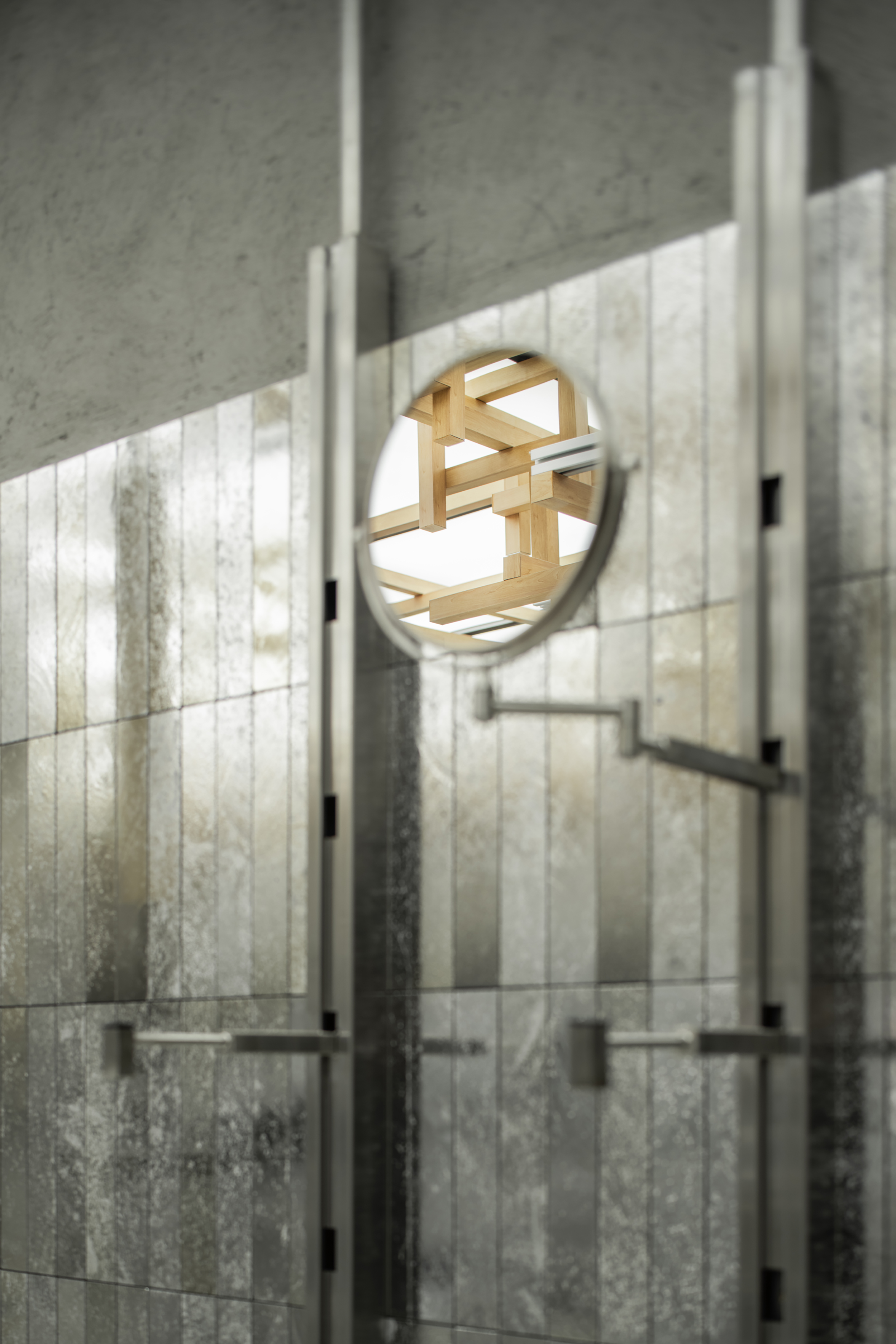
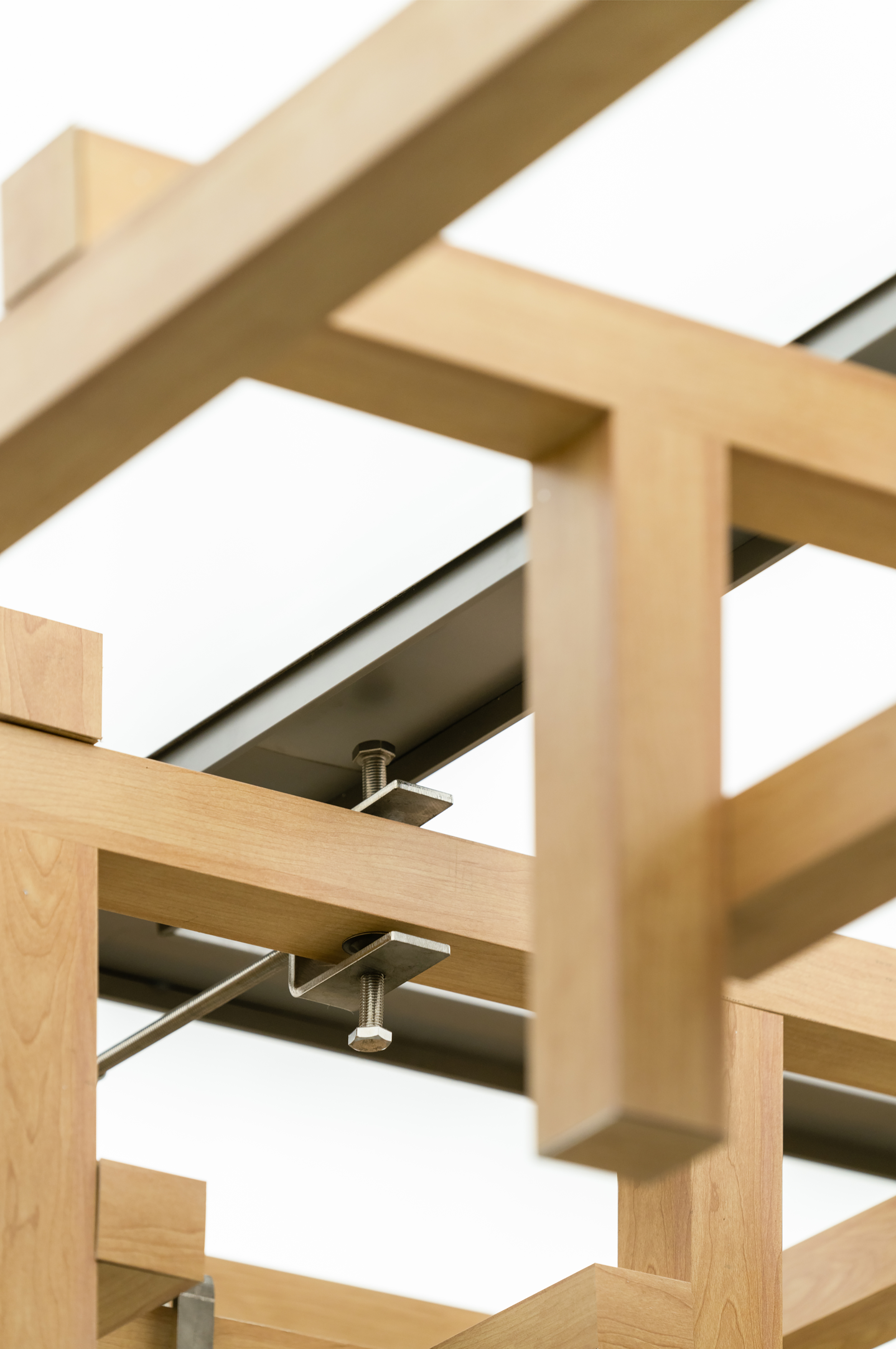
空间提取斗拱这一构件背后所承载的文化内核,适配当下语境,在原有的斗、升、拱、翘造型组合上做减法,并在传统木材之上融入金属材质,完成整体组合架构。如此方式,使空间因天花顶部阵列感的存在而更具辨识属性,承上启下,进一步完成了设计概念的传递与深层表达。
By extracting the cultural core of the bucket arch and adapting to the context, the space simplifies the original shapes and incorporates metal on wood to form the new structure. The arrays on the ceiling make the space more recognizable, which connects the whole space and further expresses the design concept deeply.

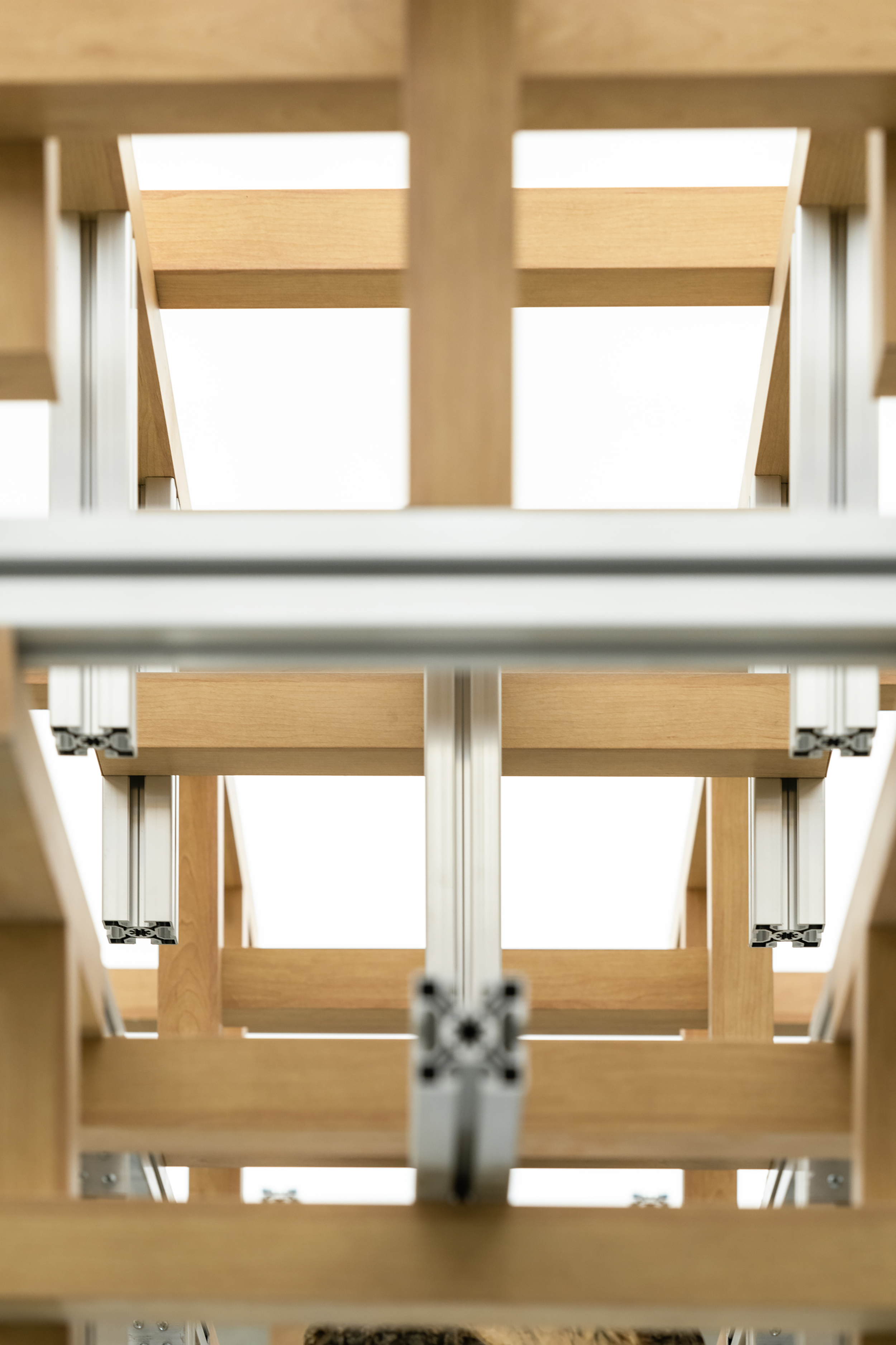
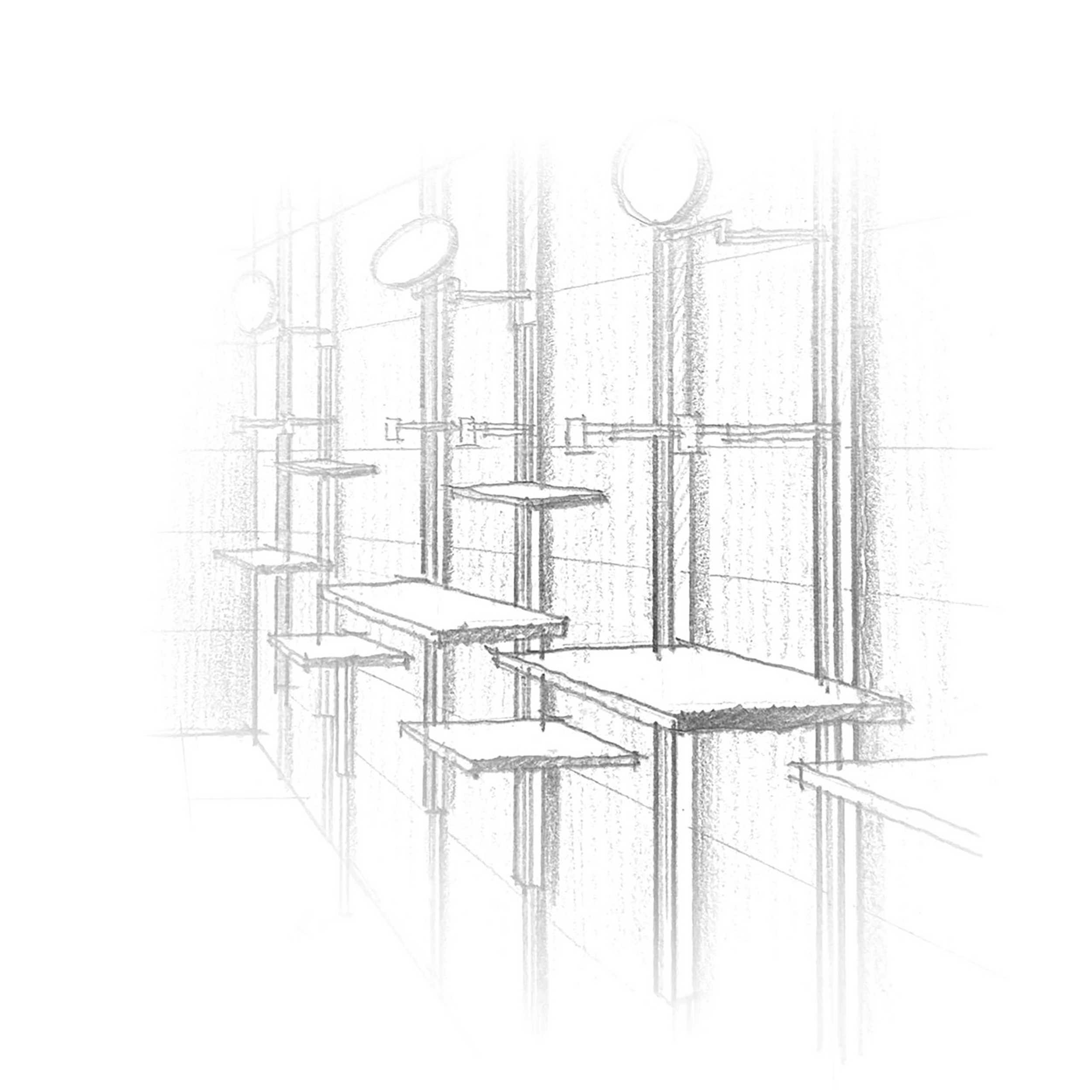
Sustainability可持续,是人类重要议题之一。回归设计而言,创造可持续发展的设计系统,是在有限资源的当下应该做出的尝试与努力。
Sustainability is one of the most important issues for humanity. Returning to design, we should make an attempt and effort to create a sustainable design system in the present when the resources are limited.
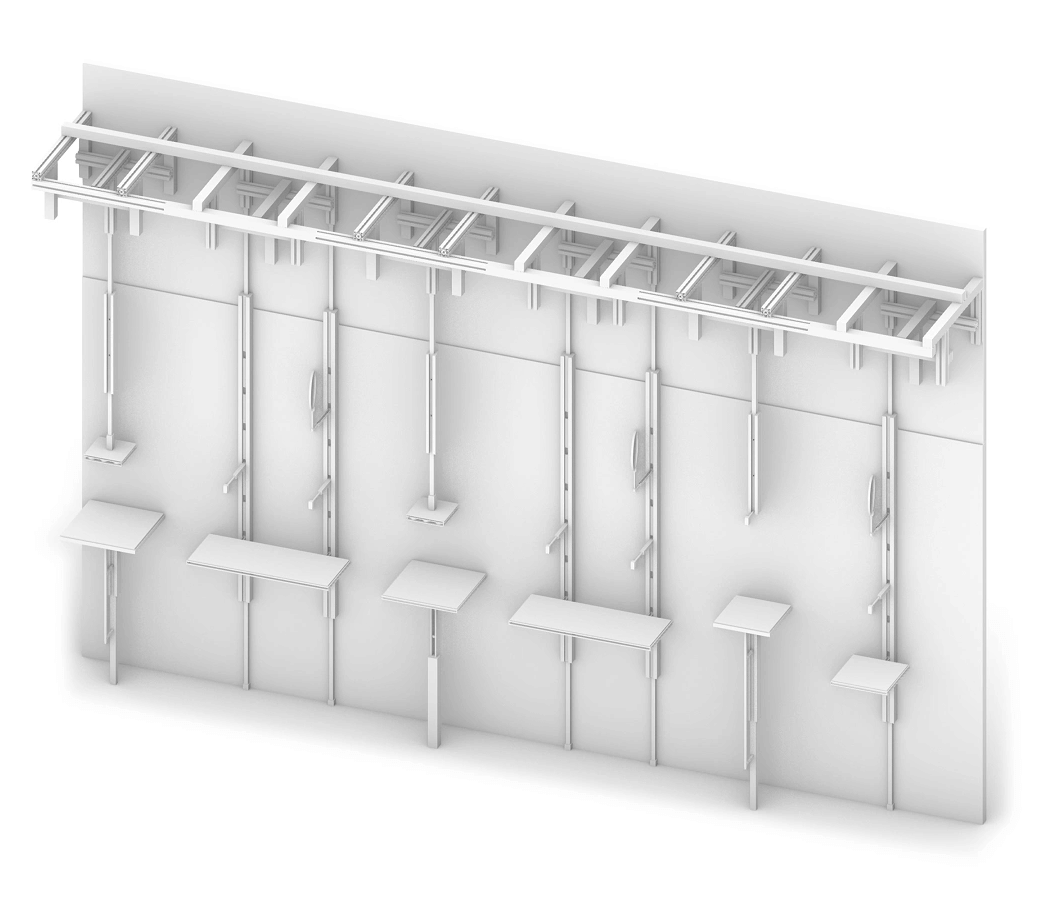
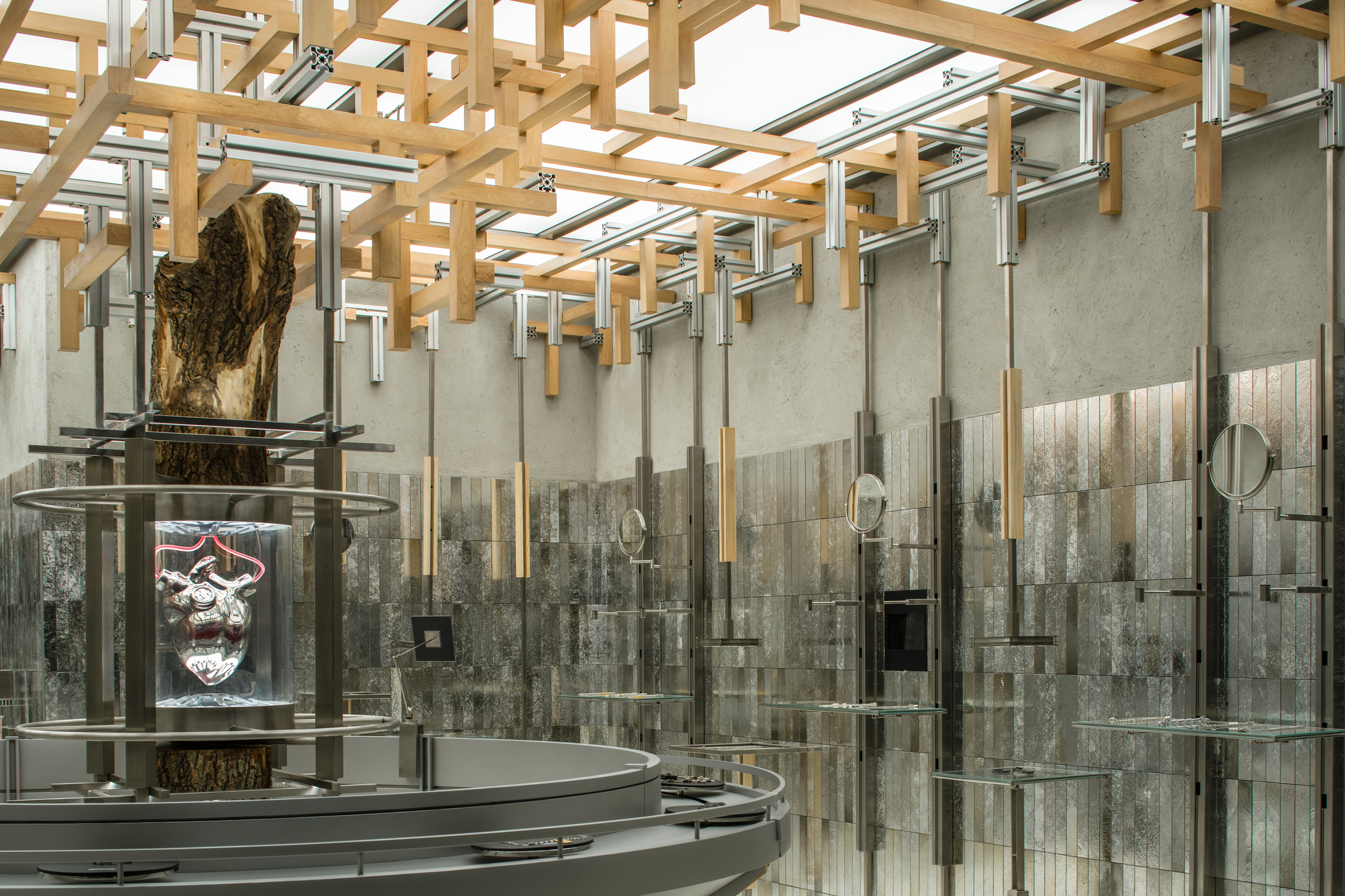
本次空间呈现,我们在创作之初便配合当下新零售的趋势,以模块化的概念完成展示台的设计,让原本固定的区块成为可拆卸灵活组件,便于运输与适配于其他项目中去。
In line with the current trend of new retailing, the design of the showcase was completed with a modular concept at the beginning of the project, allowing the original fixed blocks to become detachable and flexible components for easy transportation and adaptation to other projects.
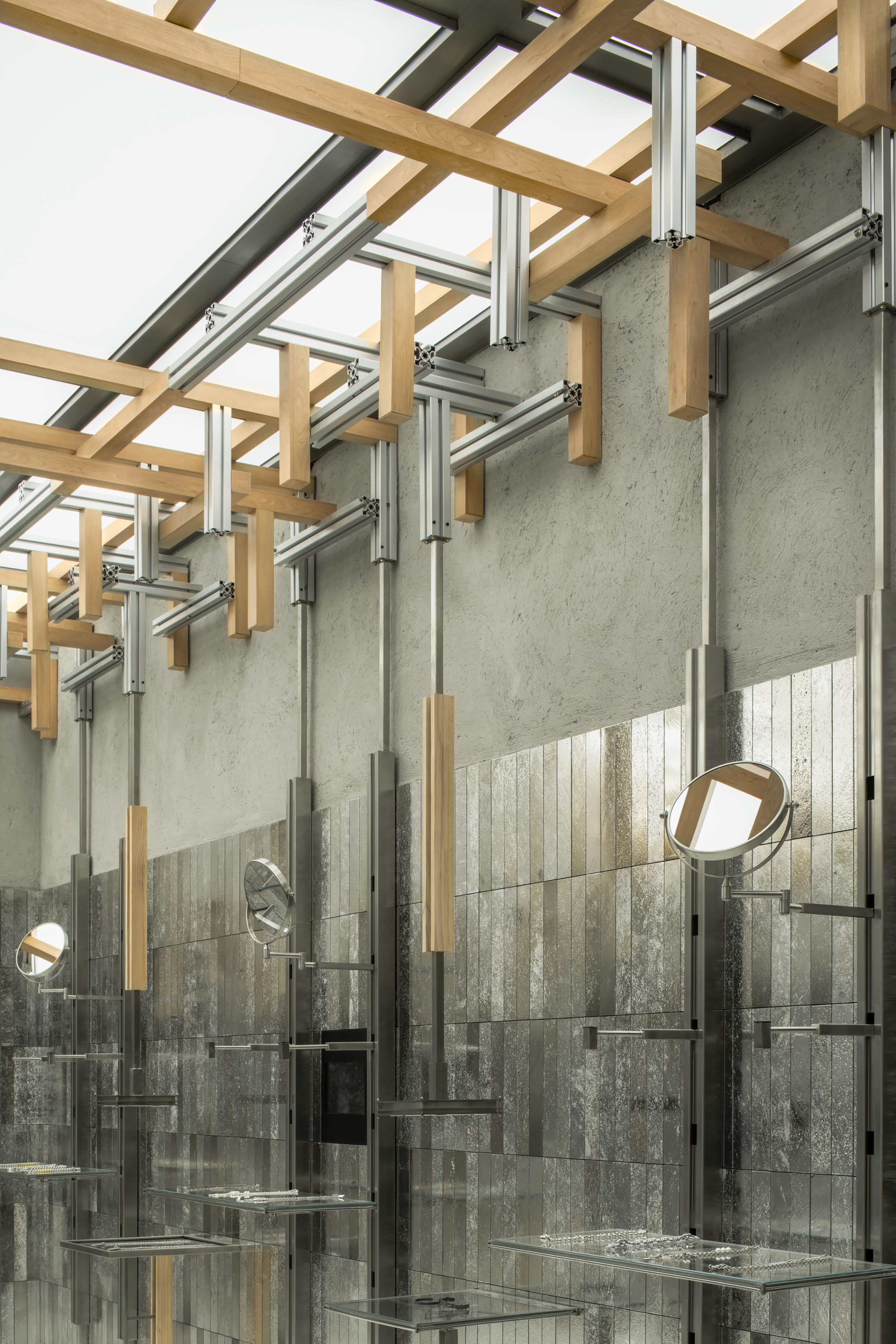
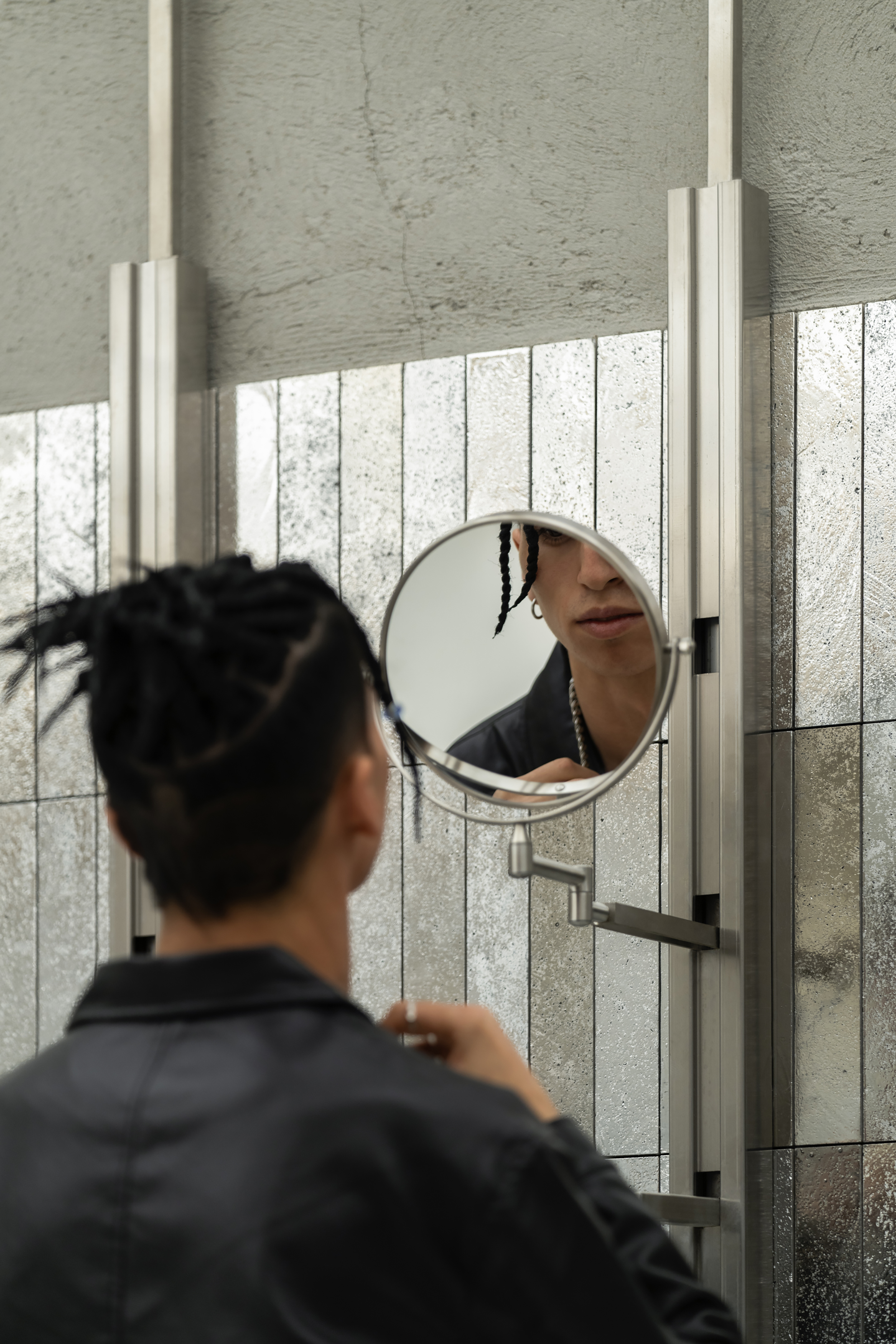
金属、玻璃等与主体一脉相承材质的穿插,圆形镜子的增设,也考虑到了受众搭配试戴环节的需求,使受众在交互体验中自然地完成选购。
The interplay of metal, glass and other materials in line with the main body and the addition of circular mirrors also has been taken into account to meet the needs of visitors in fitting process, making it a natural experience for them to complete their shopping.


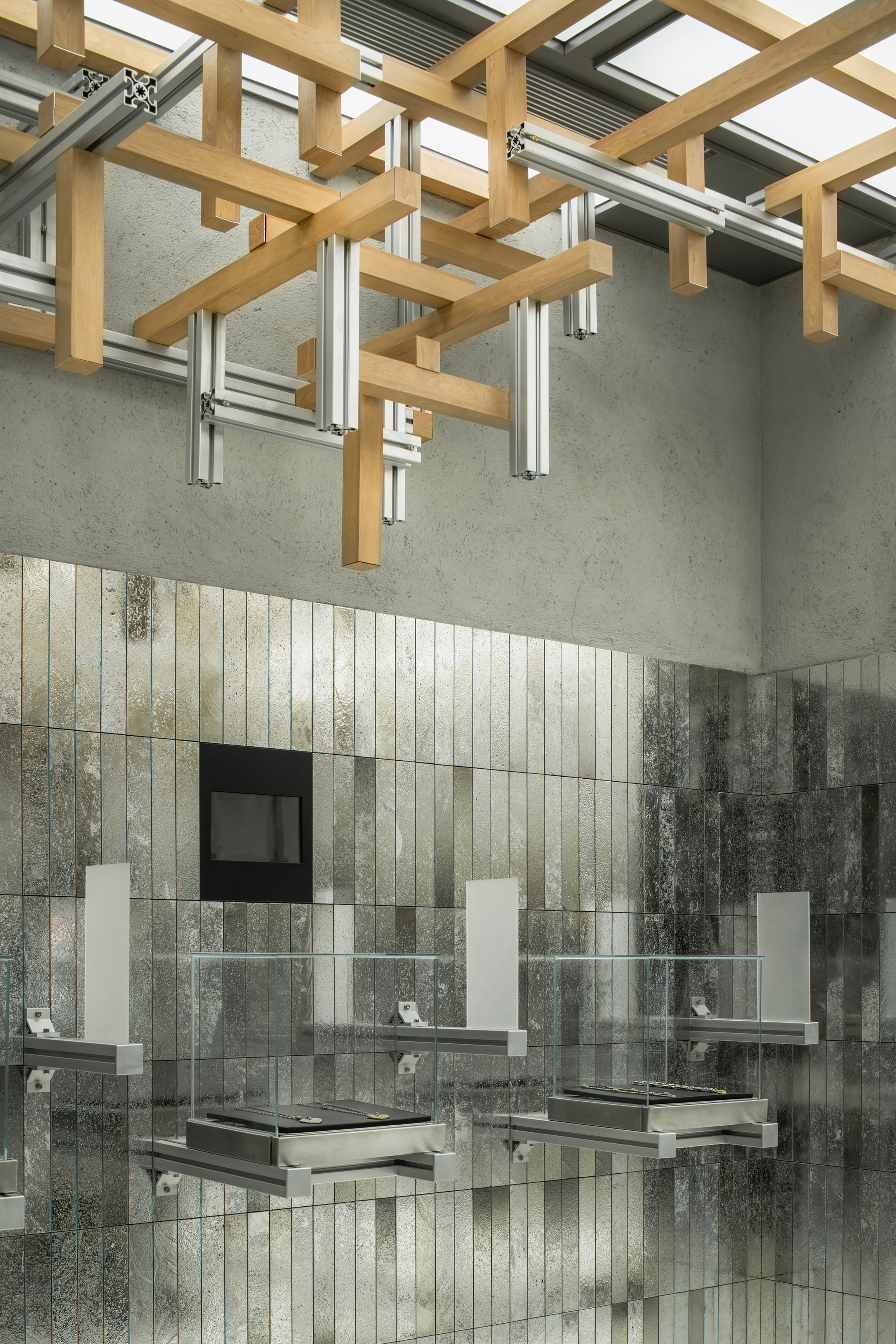
同时,在满足空间未来长续性使用的前提下,每一立面结合品牌现有产品线,通过托盘区域、柜体区域的组合设置,最大程度地满足了不同产品展示与陈列的需求。
At the same time, on the premise of meeting the future long-term use of the space, each facade is combined with the existing product lines of the brand, through the combination of tray areas and cabinet areas, to meet the needs of different product display to the greatest extent.
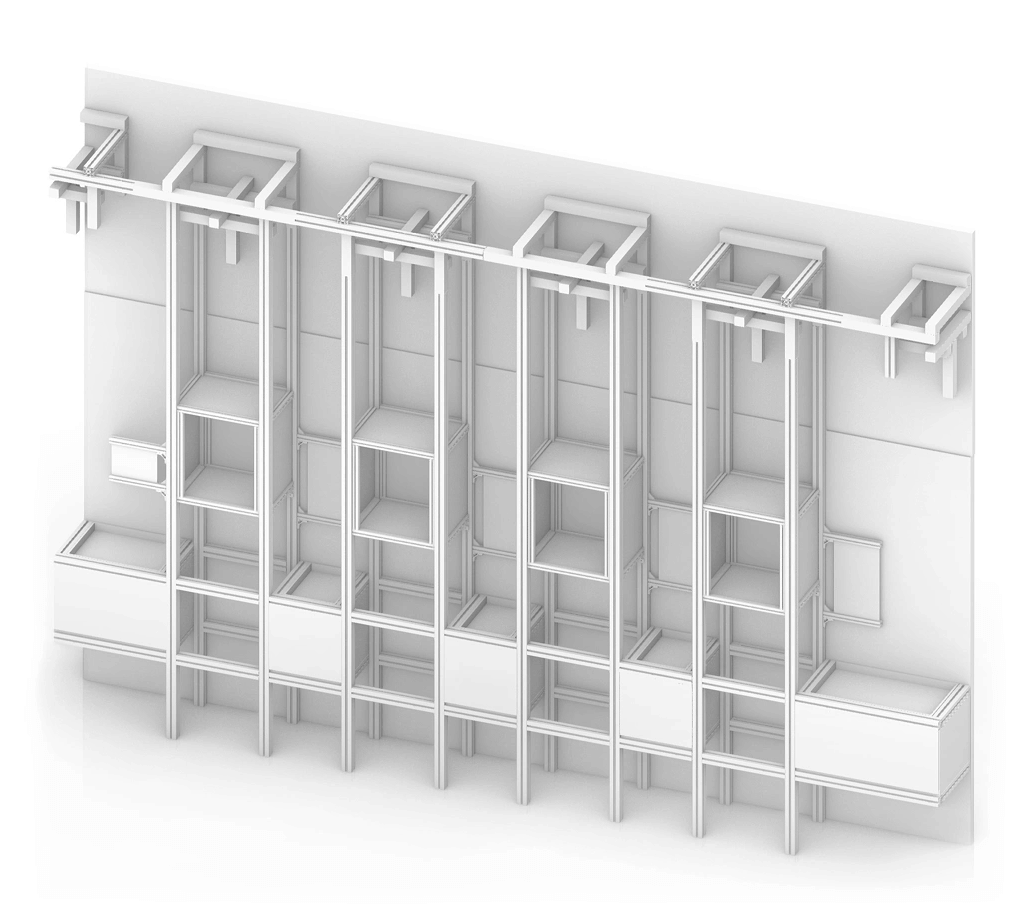
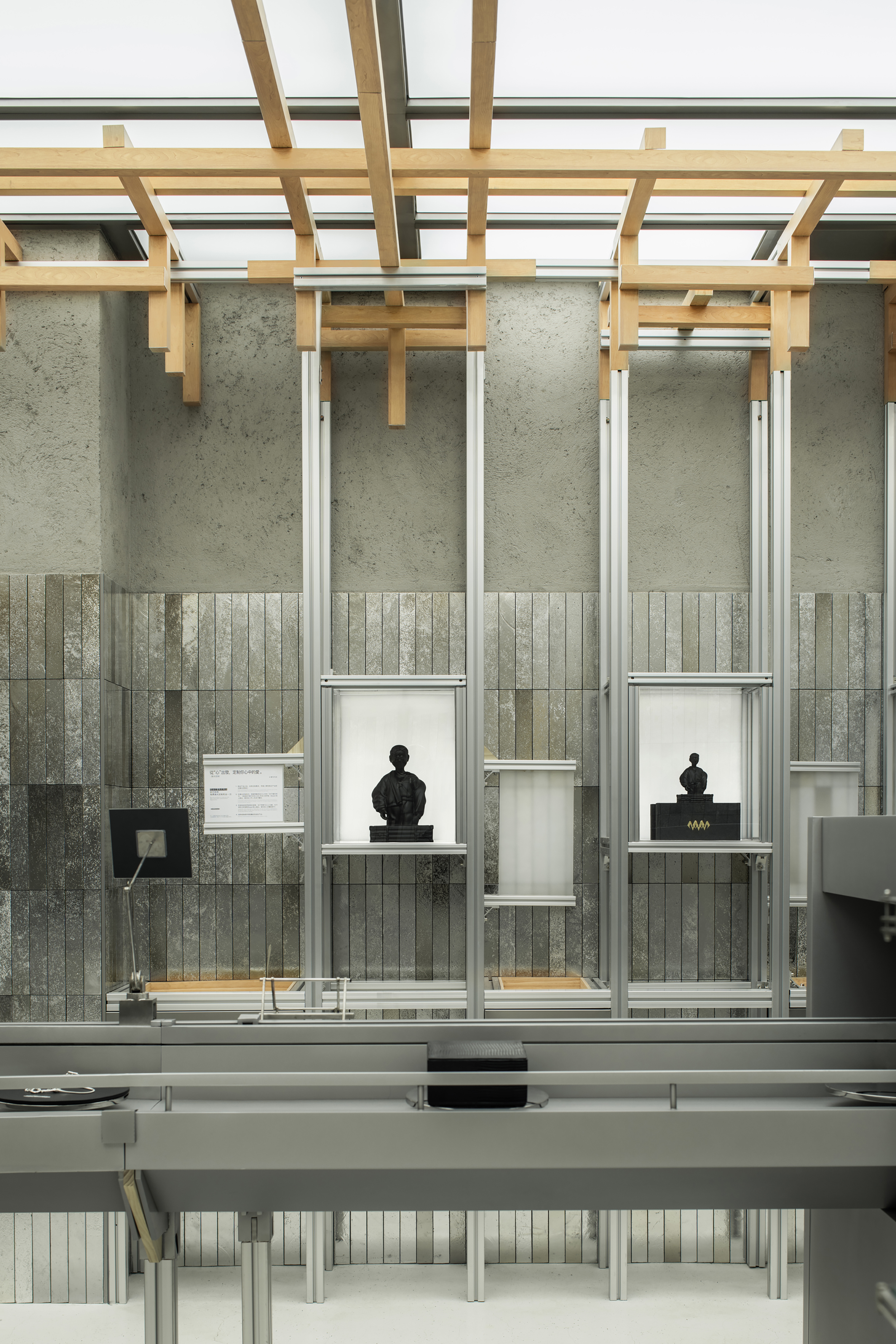
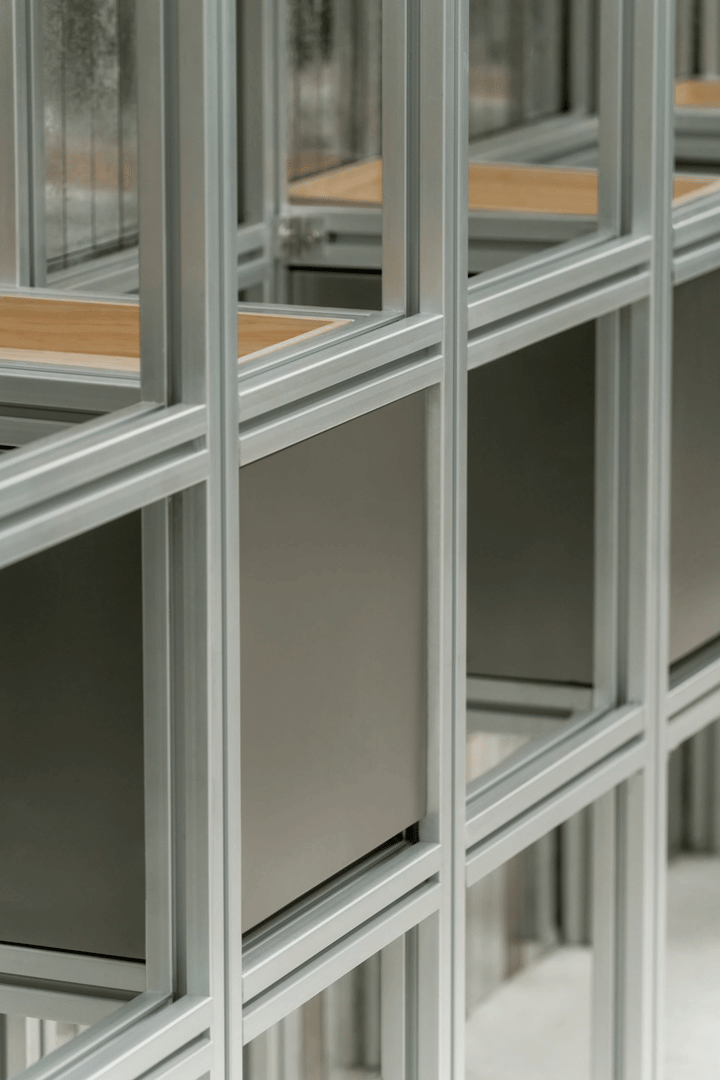
在此“墙面系统”之下,每一个托盘、柜体乃至射灯,均可根据实际产品的尺寸大小与陈列需求、视觉重点等因素,完成灵活移动、组合与拆卸。
Under this "wall system", each tray, cabinet and even spotlight can be flexibly moved, combined and disassembled according to the actual product size, display needs and visual focus.
我们通过不同模块的组合方式,匹配未来不同售卖场景、不同售卖地点的使用需求,使整体陈列区域的设计,以更加灵活、富有创造性的模块化形态存在,进一步拓展了空间的更大可能。
The combination of different modules satisfies various sales scenarios and locations in the future so that the overall display area is more flexible and creative in the form of modular, further expanding the space possibility.

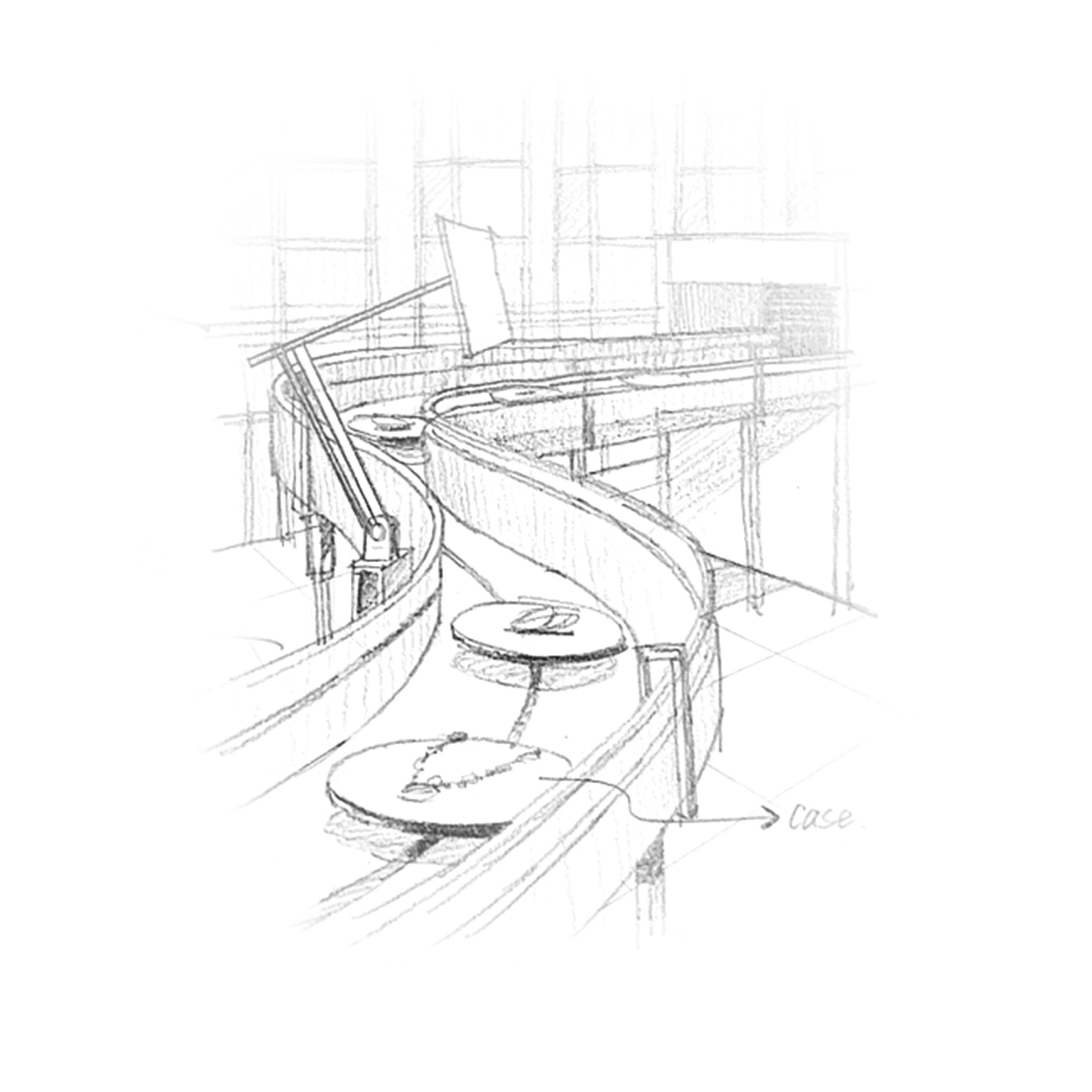
如果将以机械心脏树为视觉核心,所囊括的由顶部至四面陈列区域是基于核心概念之下的空间立面呈现,那么回归空间平面重点——传送带的设置,则是进一步贴合实际销售功能,围绕商品展示、试戴、售卖与打包的系列行为所设计的动线闭环。
Taking the mechanical heart tree as the visual focus, the display area from the top to all around is a vertical space presentation. While in terms of the plane, the key point is the conveyor belt which serves for the actual sales as a closed-loop circulation around the behaviors of product display, try-on, selling, and packaging.
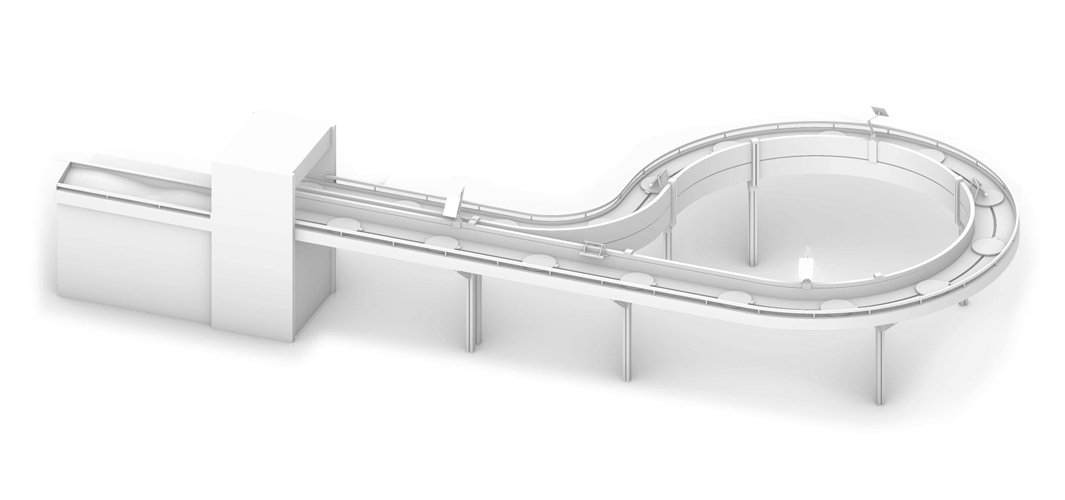
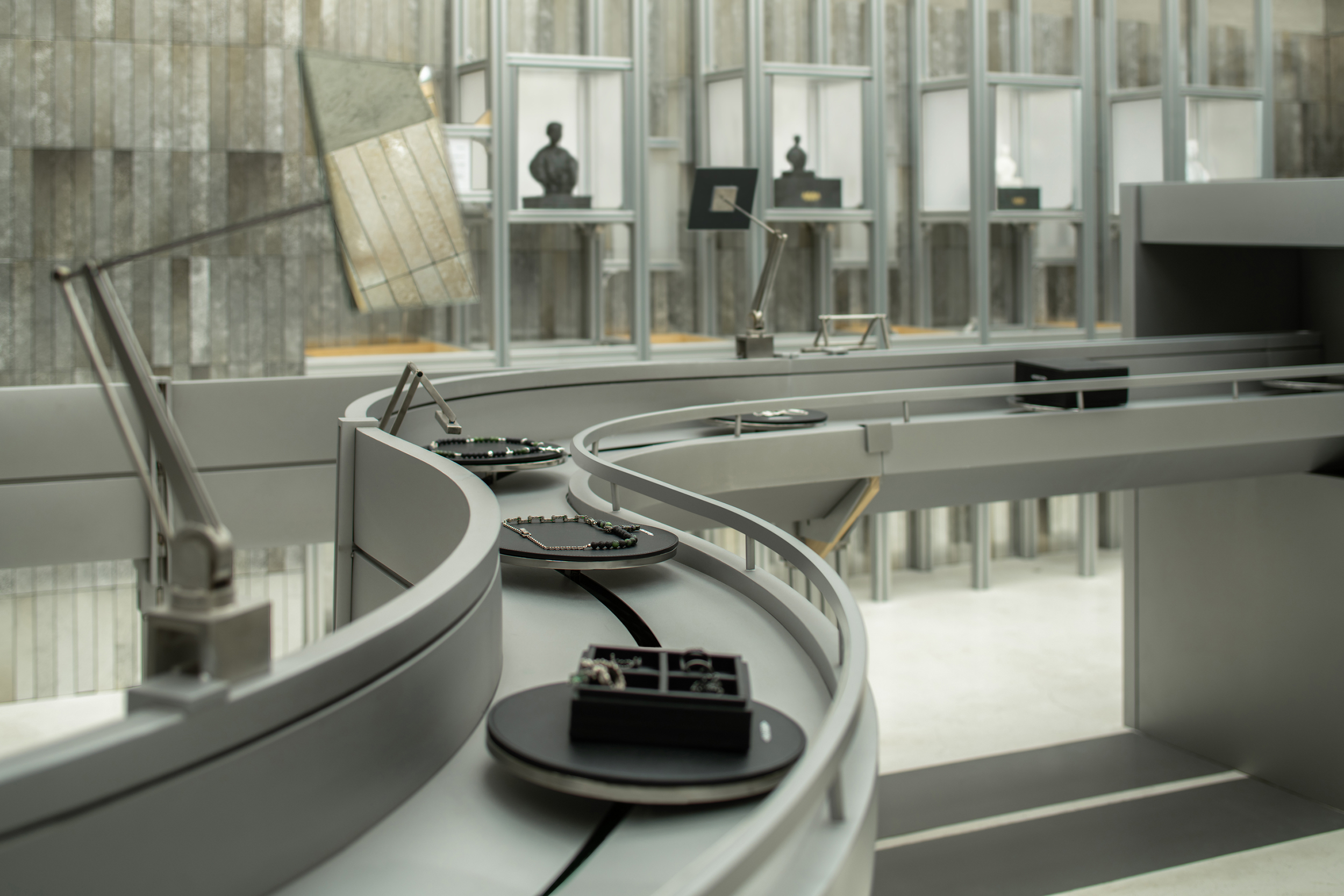
我们选取工业行为中常用的物品传输的介质——传送带,让该陈列装置在视觉表现与实际交互中通过机械运作,呈现出“动起来”的效果,以此呼应与实现“机械心脏”核心概念下的分支——血液循环系统的具象表达。
Adopting the conveyor belts commonly used in industry, it showcases the effect of "moving" through mechanical operation in visual performance and actual interaction, echoing the expression of the blood circulatory system related to the core concept of the mechanical heart.
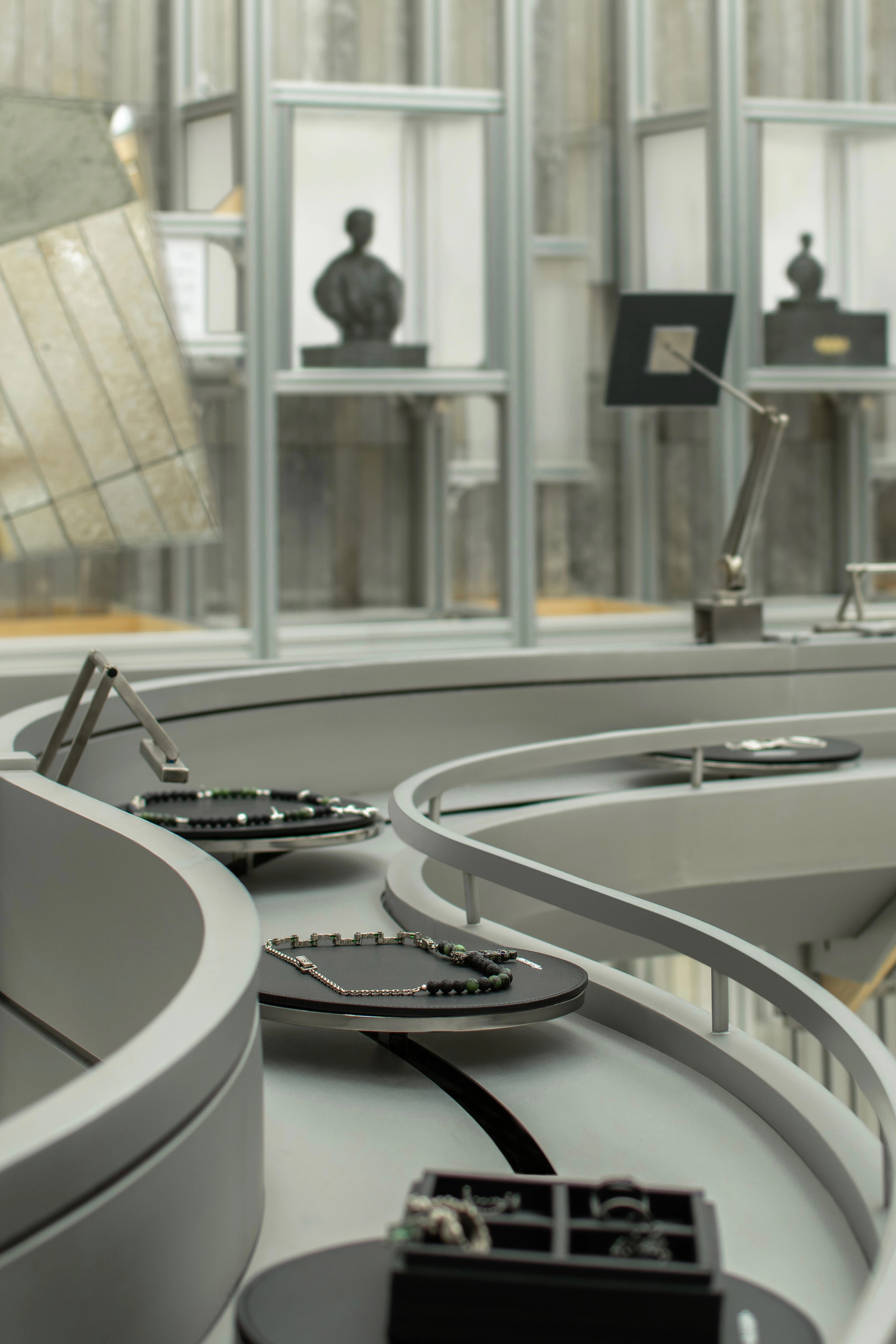
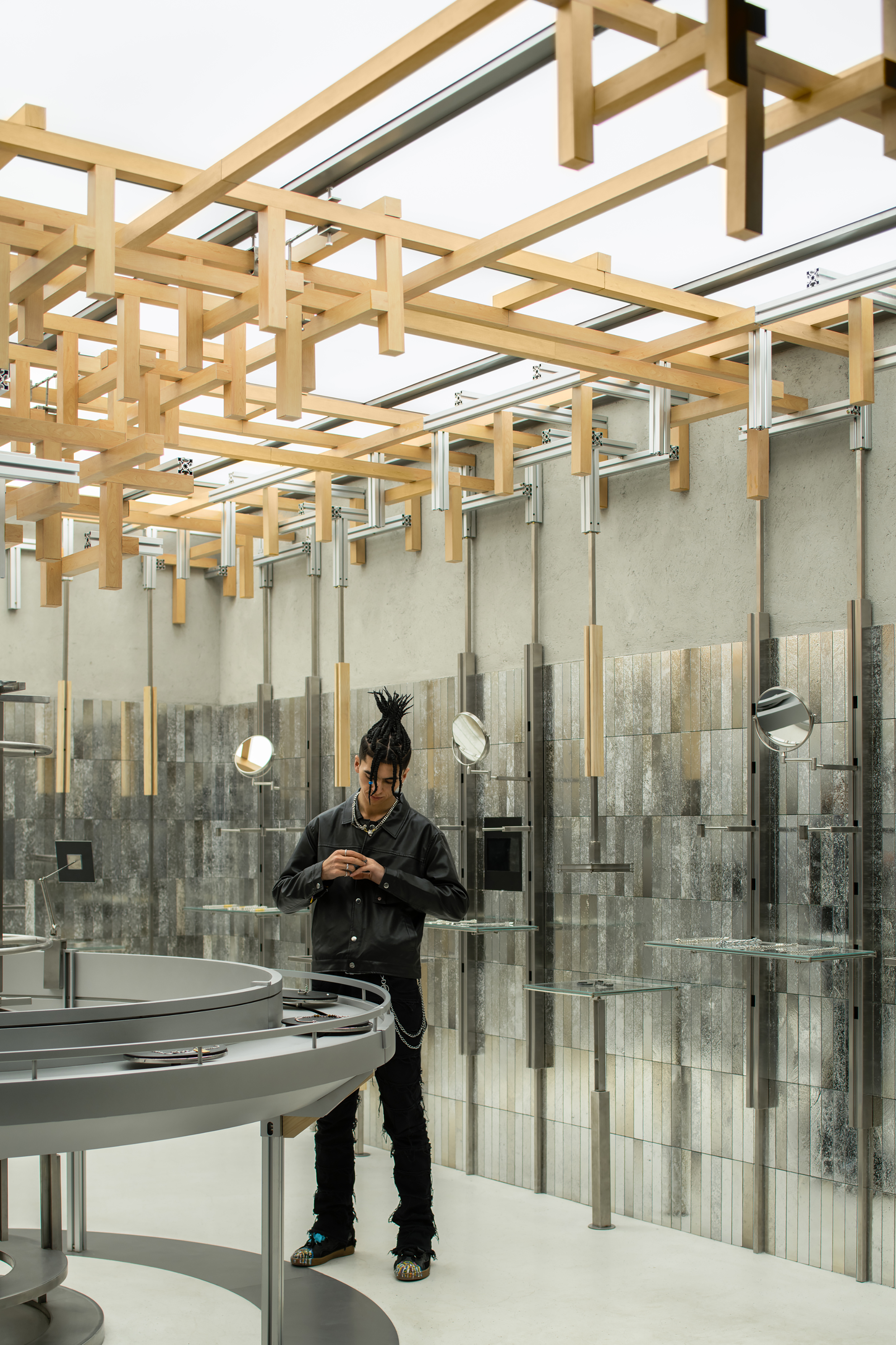
品牌icon单品陈列于传送带的圆形托盘中,随着传送通道的弧度逐一放置,黑色皮革底盘最大程度地还原与凸显金属与宝石制品本身的质感,赋予受众新颖的观览与交互体验。
The brand icon items are displayed on the circular tray of the conveyor belt. As they are placed one by one along the curved channel, the black leather tray highlights and restores the texture of metal and gemstone to the greatest extent, achieving an innovative viewing and interactive experience.
这一陈列模式的出现,不仅能够贴合品牌原有的多系列产品线与未来发展态势,也能确保进入店内的客人通过动线规划引导,最大程度实现空间体验与产品触达这一诉求。
This kind of display mode can fit the brand's multi-series product lines and future development trends. It also ensures that customers entering the shop are guided through the planning of the movement to maximize their experience from space and the reach of the products.

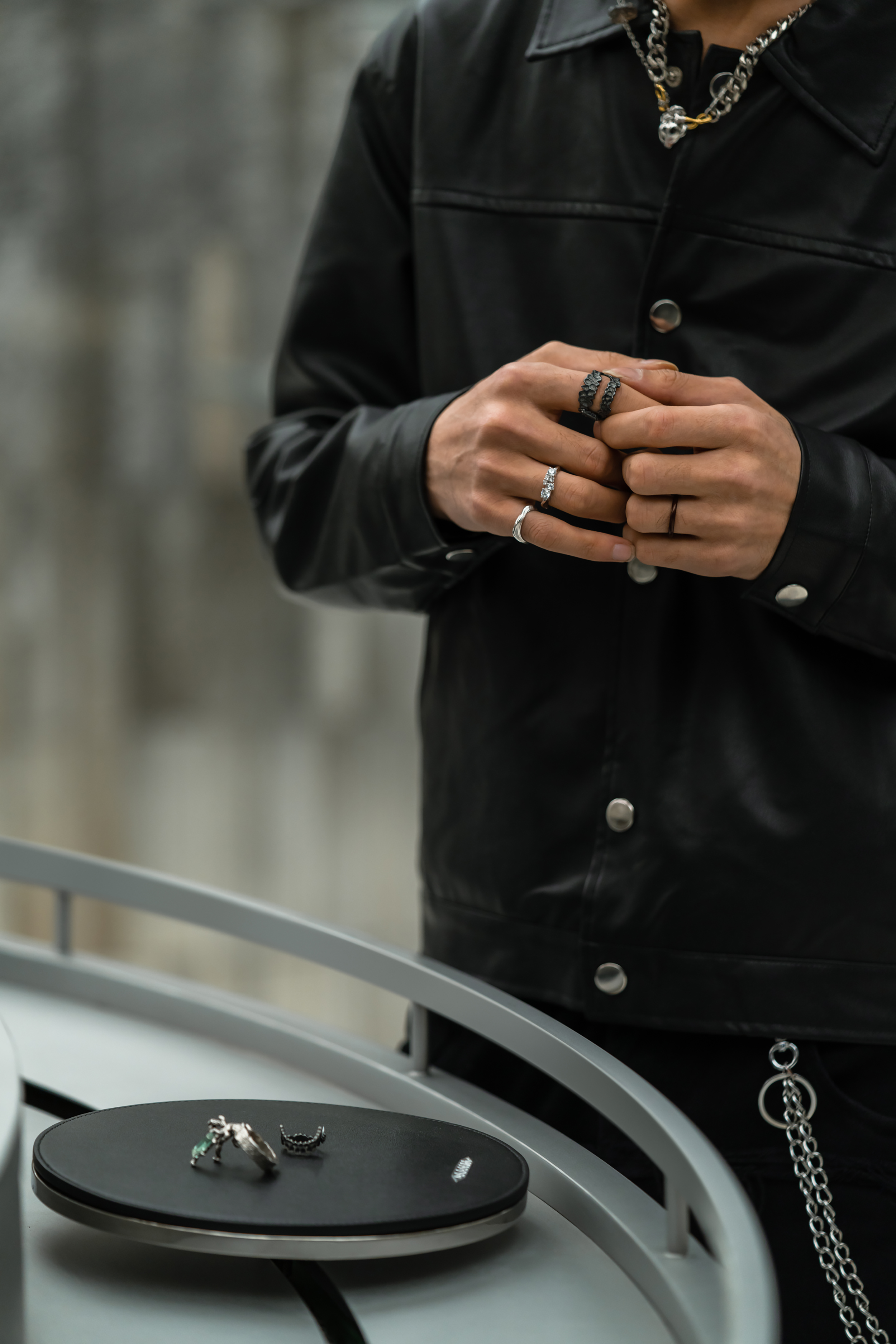
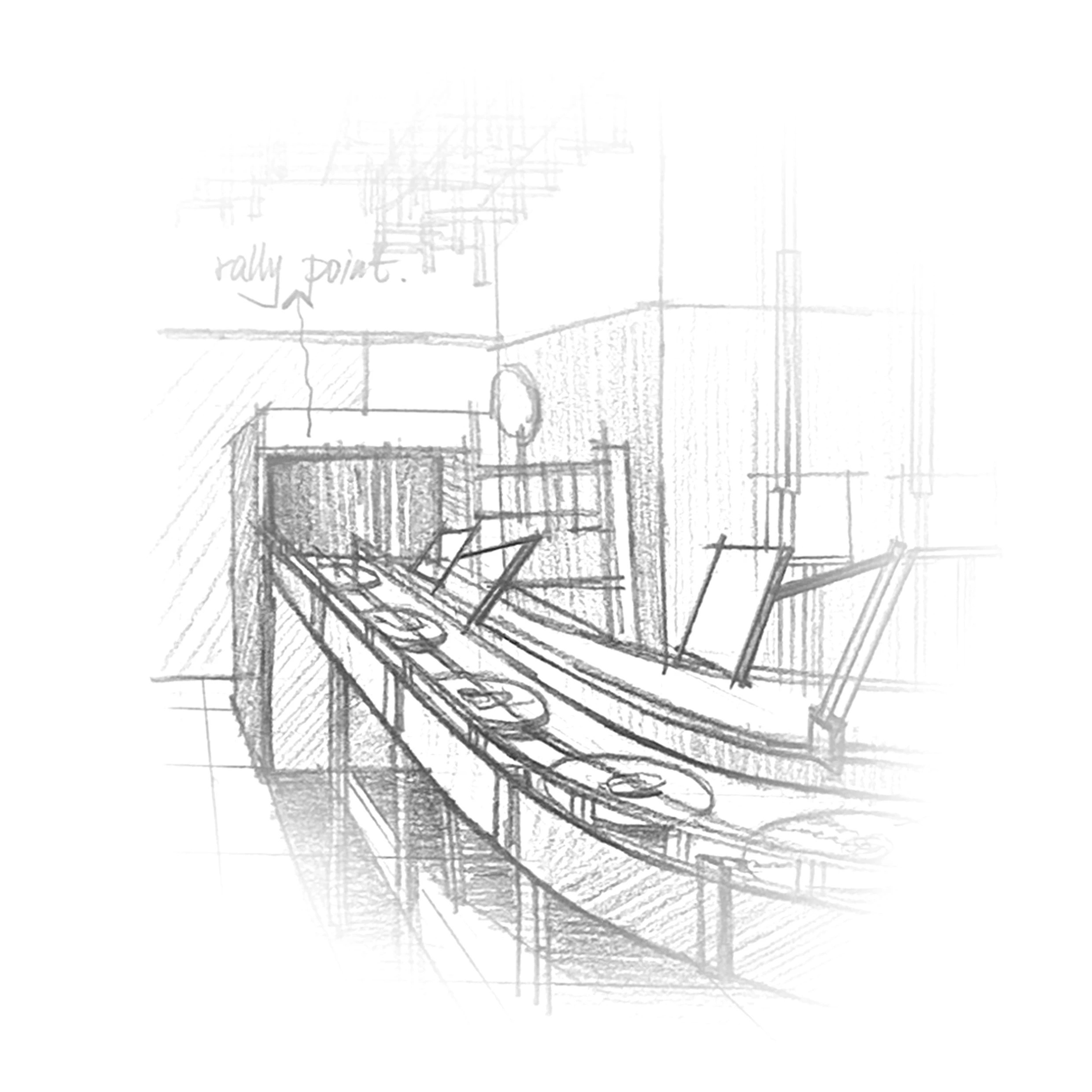
这一延续工业作业中“传送”的流程,回归到实际消费环节时,也能将收银区作为“打包”的最后一步,以此完成空间收银功能的嵌入。
When the industrial transmission process returns to the actual consumption, the cashier area is the last step after packaging. In this way, the cashier function is embedded into the space.
此举不仅打破了常规收银区大体块的存在形式,且通过更加灵活、轻量的隔断设计,弱化其构建模式,打消原有边界,创建出一个属于空间外部和内部联系的通道, 使其在保持独立功能的同时,又达到相互融合,模糊空间既有边界,使整体场域实现完整性与连续性。
It breaks the conventional large cashier area, weakens the construction mode, and eliminates the original boundary through a more flexible and lightweight partition. The project creates a channel that belongs to the external and internal connections of the space. So that it can achieve mutual integration while maintaining independent functions, blur the existing boundaries, and realize the integrity and continuity of the overall space.

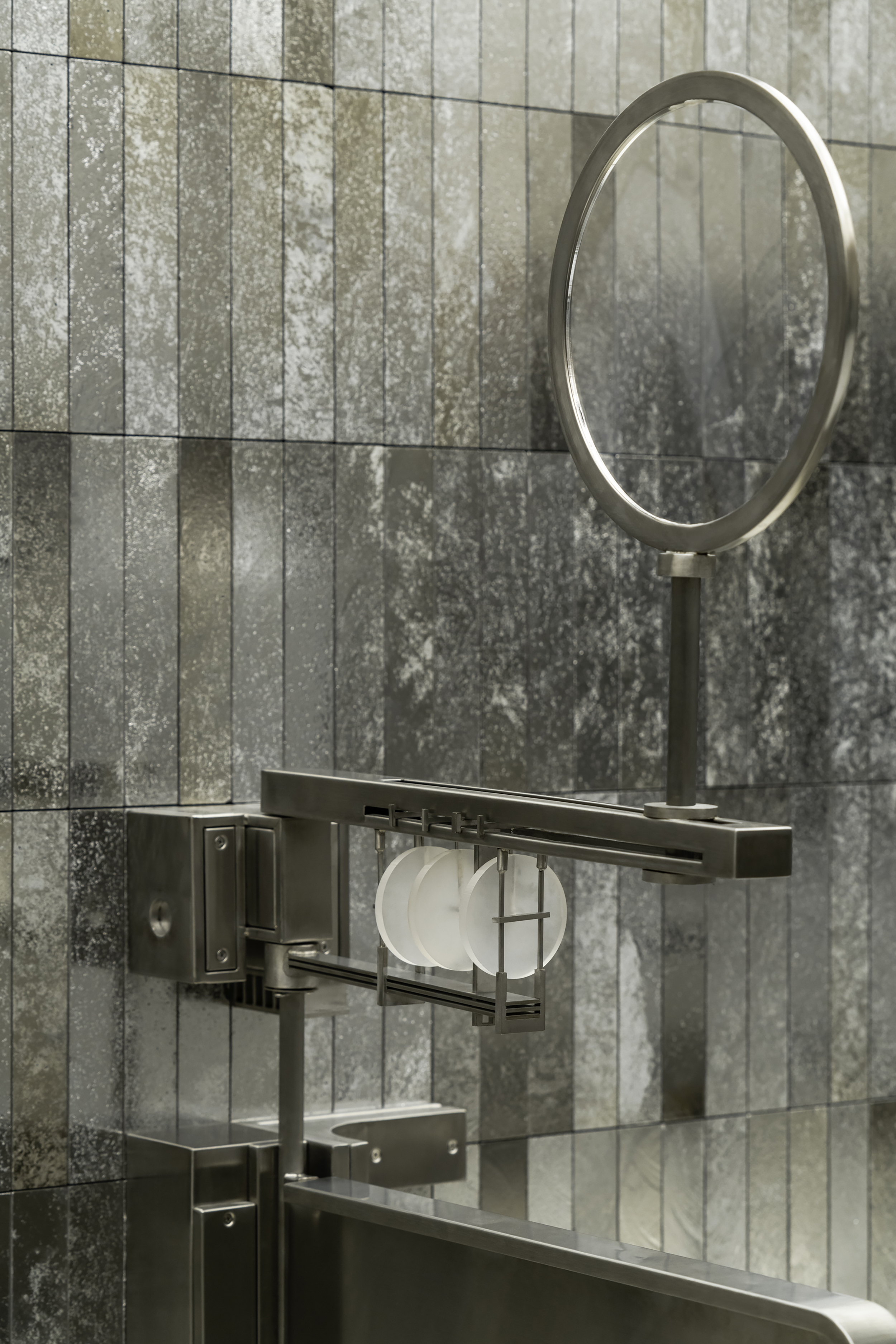
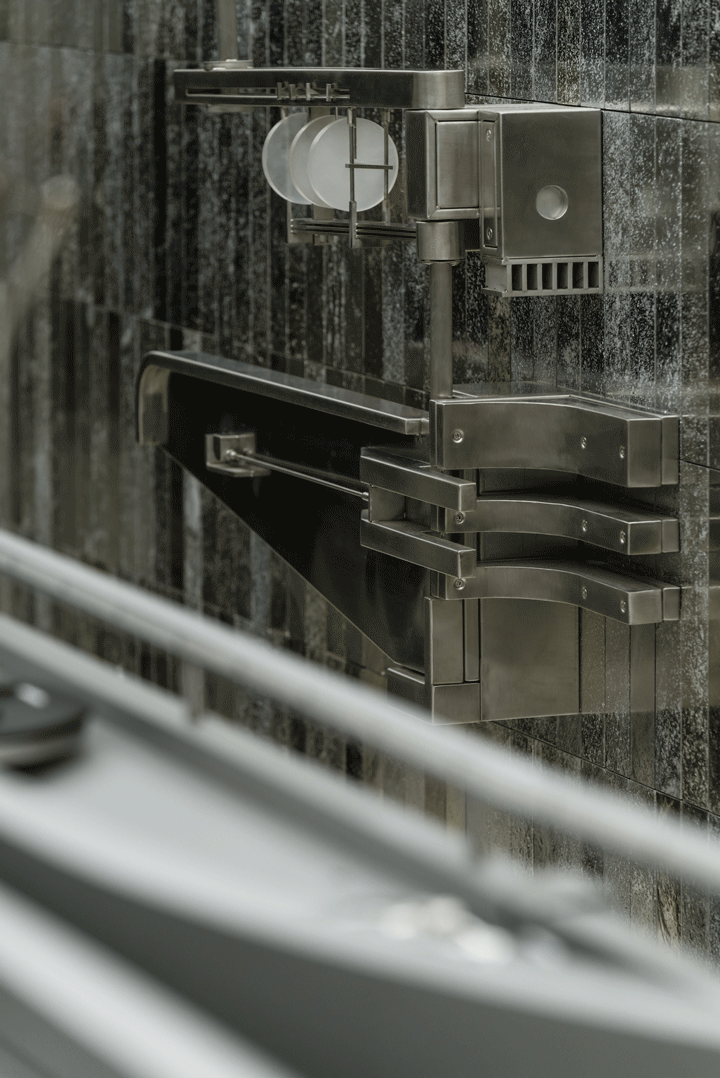
延续工匠精神,持续生长,永续跃动
Continuing the craftsmanship spirit of our fathers.
Continuously growing, forever leaping.
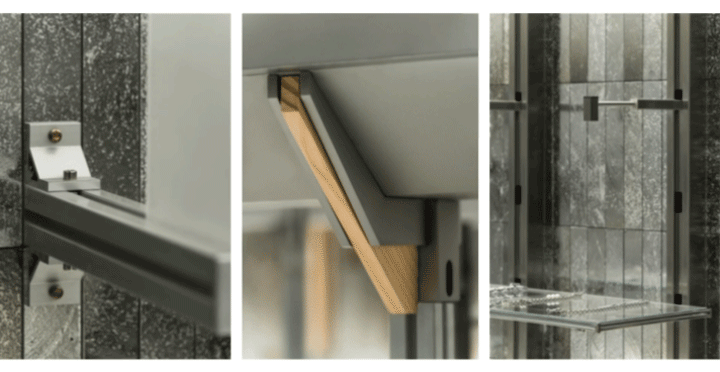
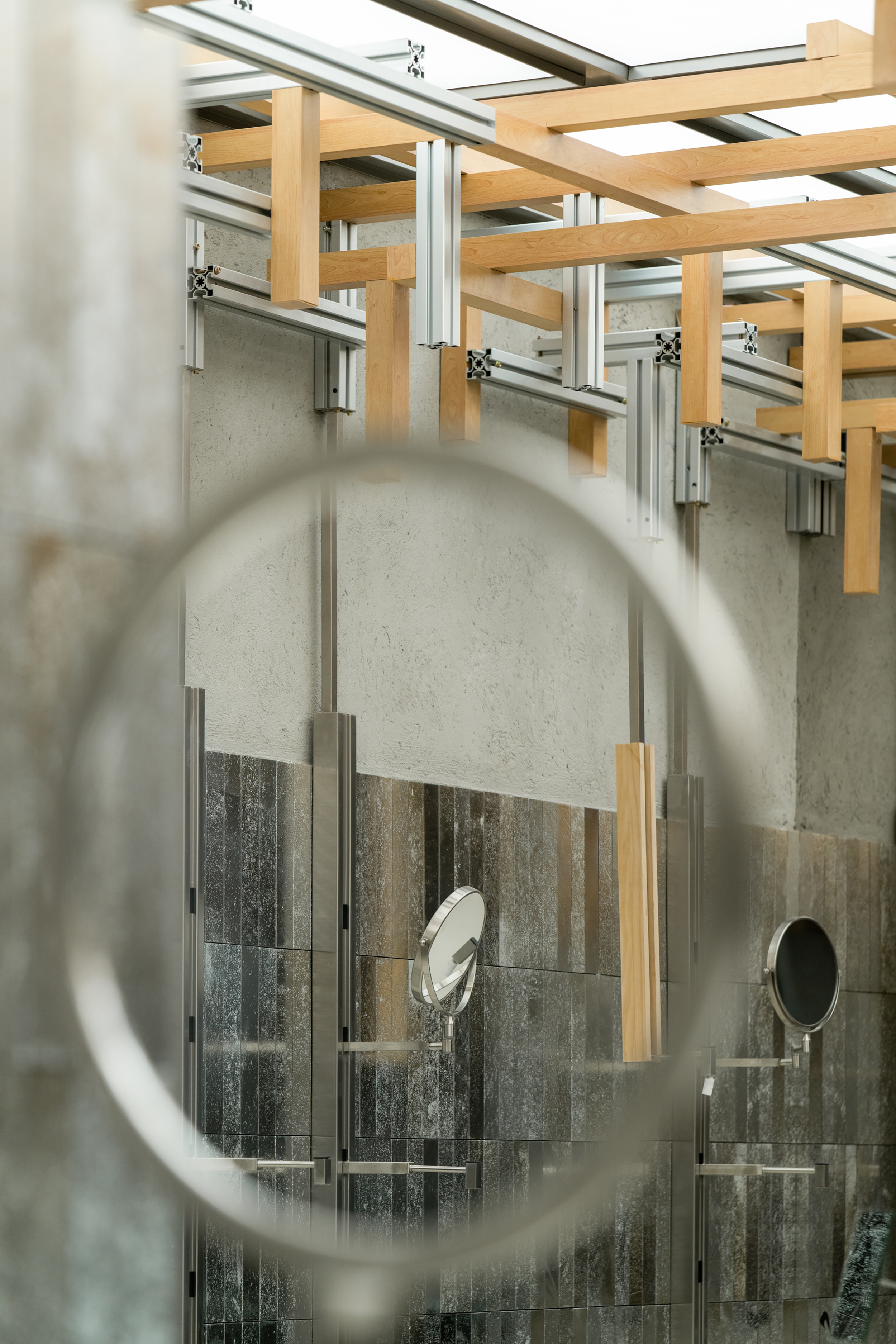
完整项目信息
项目名称:BABAMA Concept store
项目类型:室内
项目地点:上海市兴业路123弄6号
设计单位:ATMOSPHERE氣象建築
主创建筑师:Tommy Yu
设计团队完整名单:Aubrey Liu.Valo Xiao.
建成时间:2023年3月
建筑面积:108平方米
动画设计:ViVi Lee
道具装置:ATM Team
灯光方案:ArtLuci x Owen
工程单位:上海壹木禾建筑工程有限公司
摄影:形在空间摄影Here Space贺川
版权声明:本文由ATMOSPHERE氣象建築授权发布。欢迎转发,禁止以有方编辑版本转载。
投稿邮箱:media@archiposition.com
上一篇:头文字“B”,BONELESS广州东山口概念店 / 蘑菇云设计工作室
下一篇:欧洲议会大厦,历史与文化的联结 / 法国AS建筑工作室